
1
In the beginning there was nothing, which exploded.Terry Pratchett

2
Man suffers only because he takes seriously what the gods made for fun.Alan W. Watts

3
Belief is the death of intelligence.Robert Anton Wilson

4
If it turns out that there is a God...the worst that you can say about him is that basically he's an underachiever.Woody Allen
5
For, after all, how do we know that two and two make four? Or that the force of gravity works? Or that the past is unchangeable? If both the past and the external world exist only in the mind, and if the mind itself is controllable — what then?George Orwell

6
The menu is not the meal.Alan W. Watts
7
I suppose therefore that all things I see are illusions; I believe that nothing has ever existed of everything my lying memory tells me. I think I have no senses. I believe that body, shape, extension, motion, location are functions. What is there then that can be taken as true? Perhaps only this one thing, that nothing at all is certain.Unknown

8
Each star is a mirror reflecting the truth inside you.Aberjhani
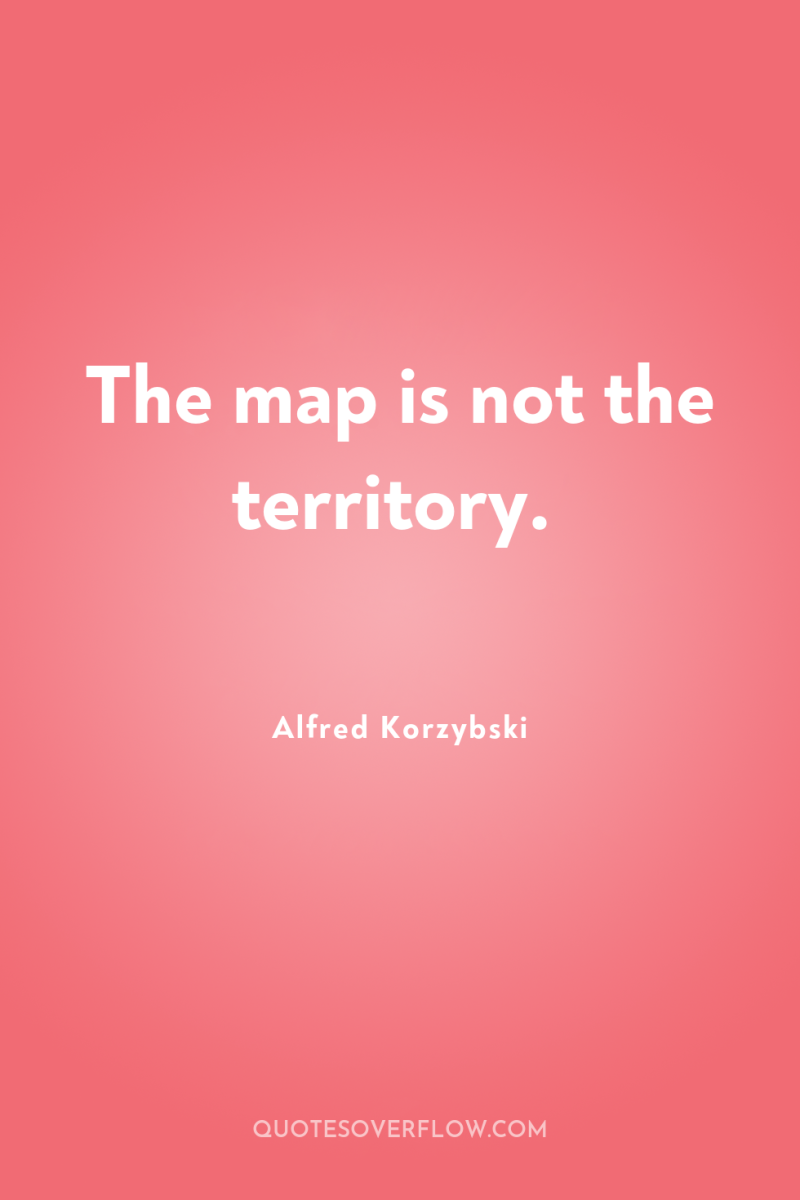
9
The map is not the territory.Alfred Korzybski
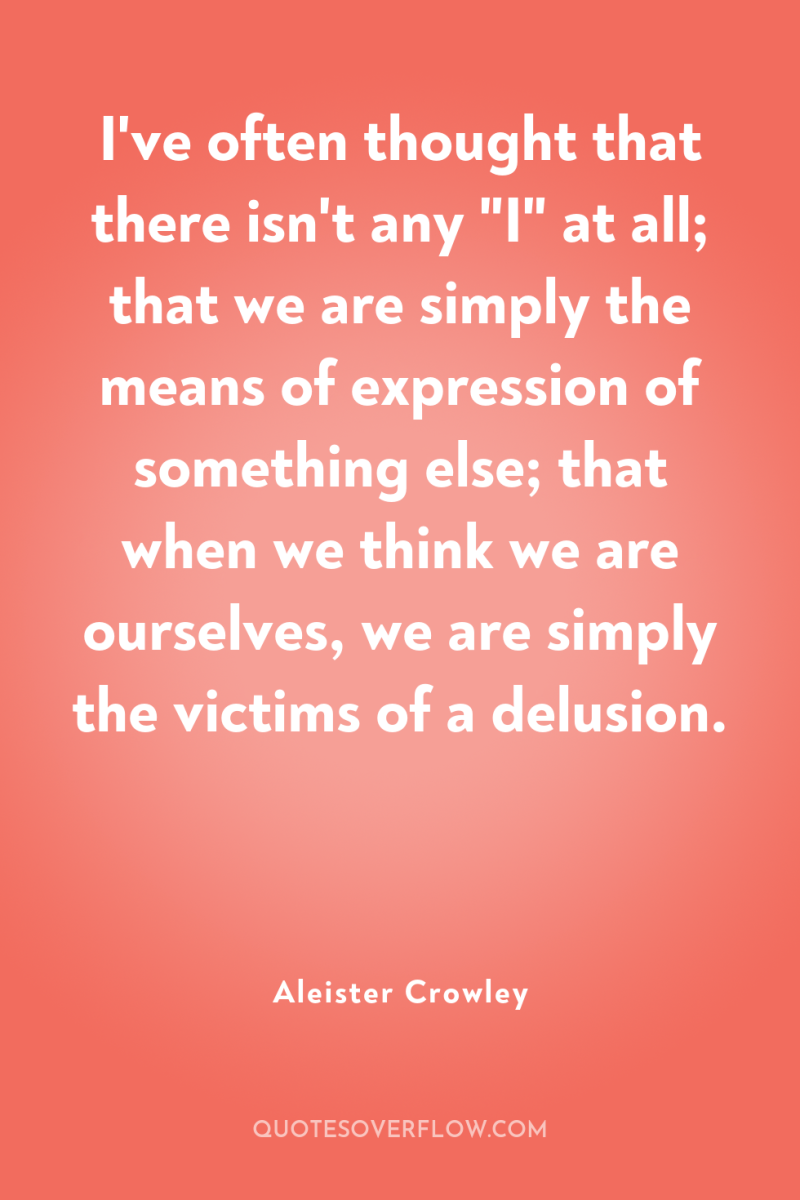
10
I've often thought that there isn't any "I" at all; that we are simply the means of expression of something else; that when we think we are ourselves, we are simply the victims of a delusion.Aleister Crowley
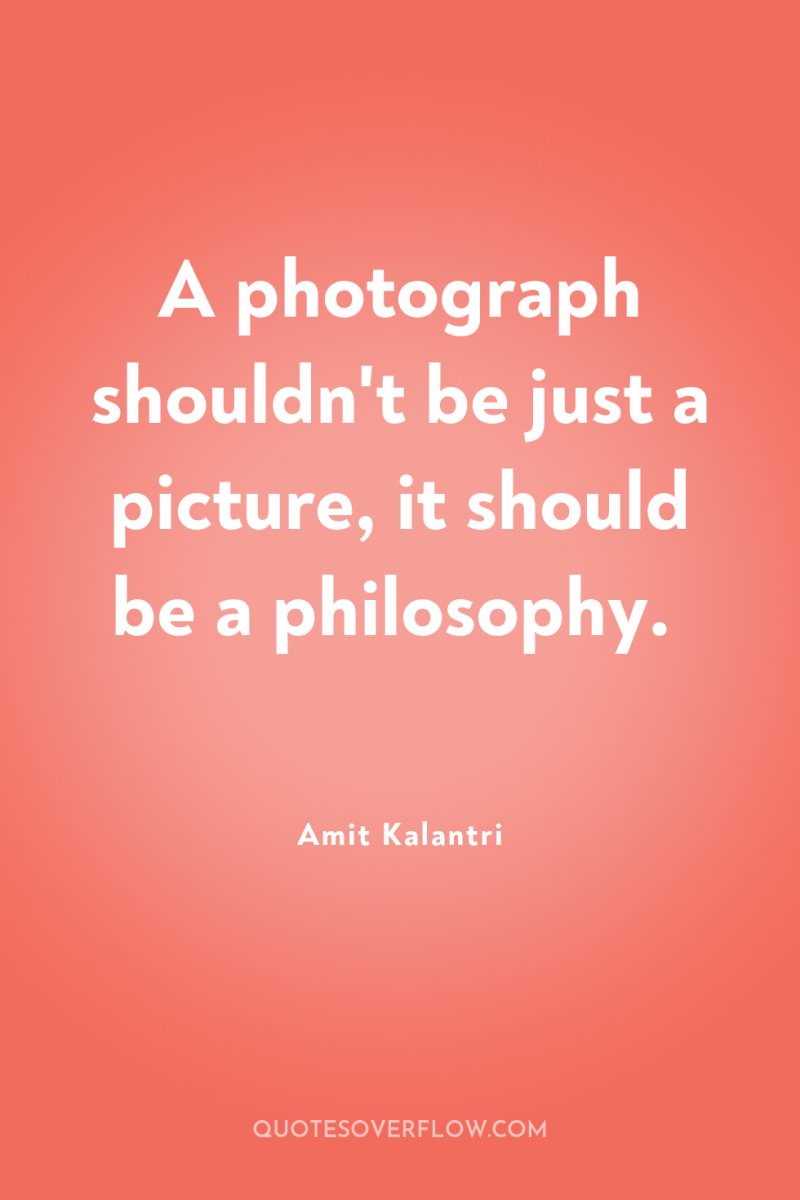
11
A photograph shouldn't be just a picture, it should be a philosophy.Amit Kalantri
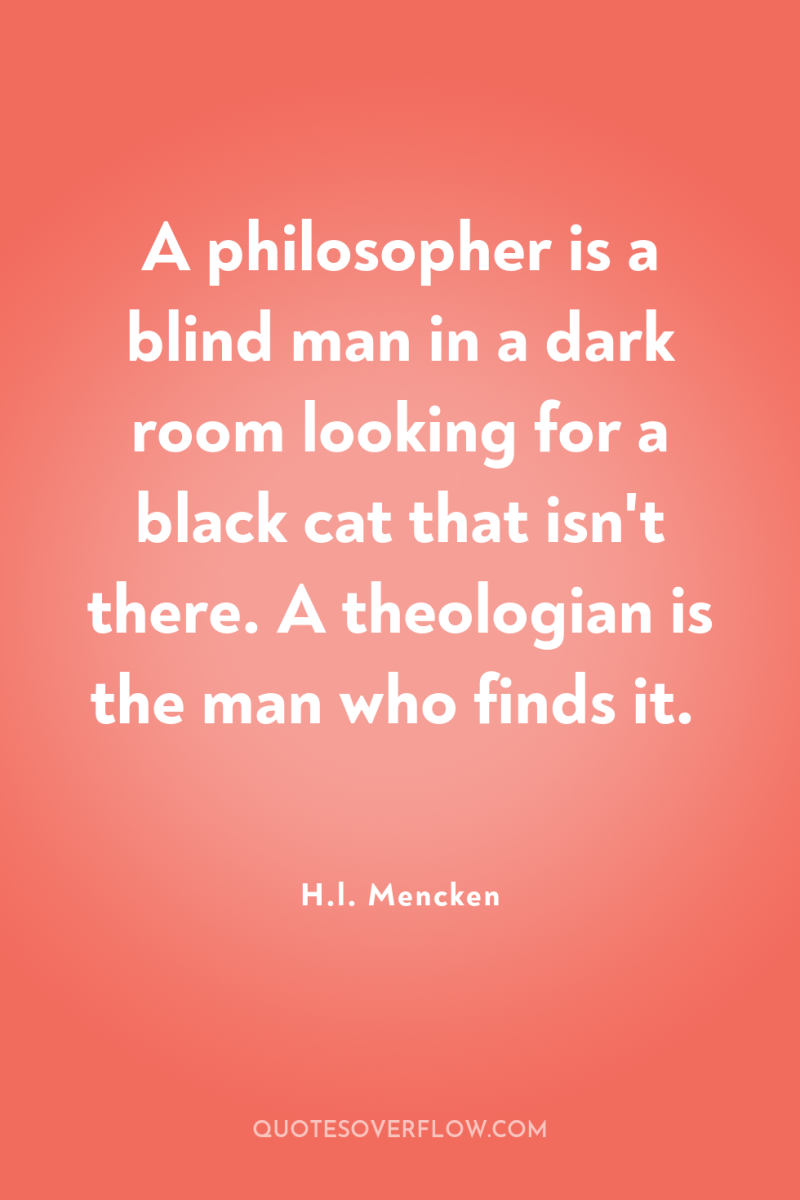
12
A philosopher is a blind man in a dark room looking for a black cat that isn't there. A theologian is the man who finds it.H.l. Mencken

13
A bridge of silver wings stretches from the dead ashes of an unforgiving nightmareto the jeweled vision of a life started anew.Aberjhani
14
One can ask why the I has to appear in the cogito {Descartes’ argument “I think therefore I am.}, since the cogito, if used rightly, is the awareness of pure consciousness, not directed at any fact or action. In fact the I is not necessary here, since it is never united directly to consciousness. One can even imagine a pure and self-aware consciousness which thinks of itself as impersonal spontaneity.JeanPaul Sartre
15
Love taught me to die with dignity that I might come forth anew in splendor. Born once of flesh, then again of fire, I was reborn a third time to the sound of my name humming haikus in heaven’s mouth.Aberjhani

16
Whatsoever is, is in God, and without God nothing can be, or be conceivedBaruch Spinoza

17
After your death, you will be what you were before your birth.Arthur Schopenhauer
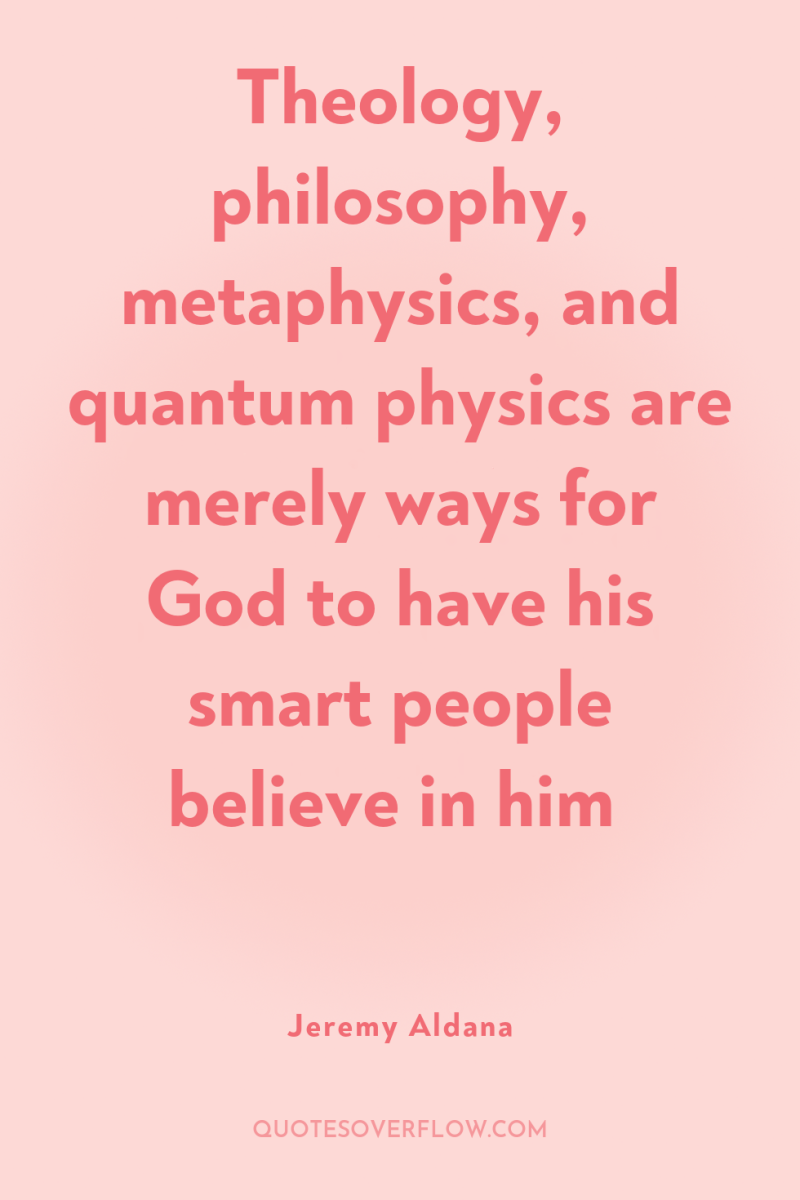
18
Theology, philosophy, metaphysics, and quantum physics are merely ways for God to have his smart people believe in himJeremy Aldana
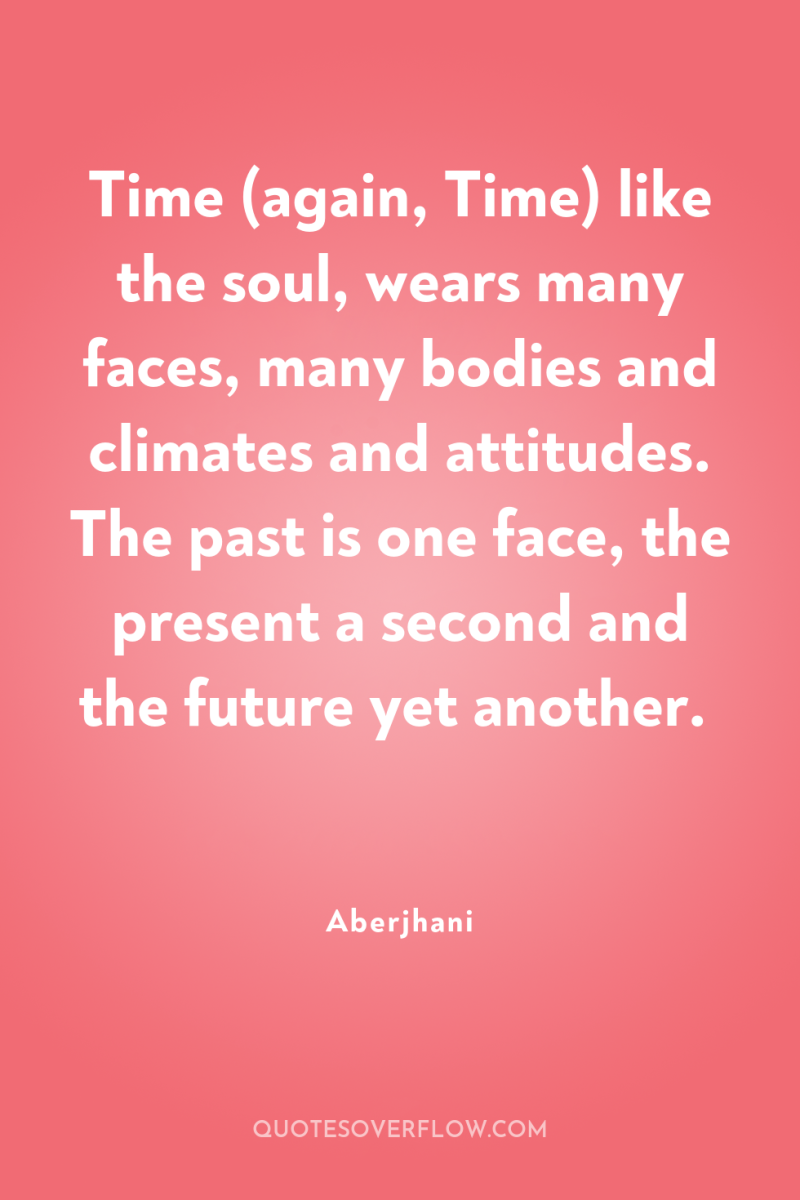
19
Time (again, Time) like the soul, wears many faces, many bodies and climates and attitudes. The past is one face, the present a second and the future yet another.Aberjhani
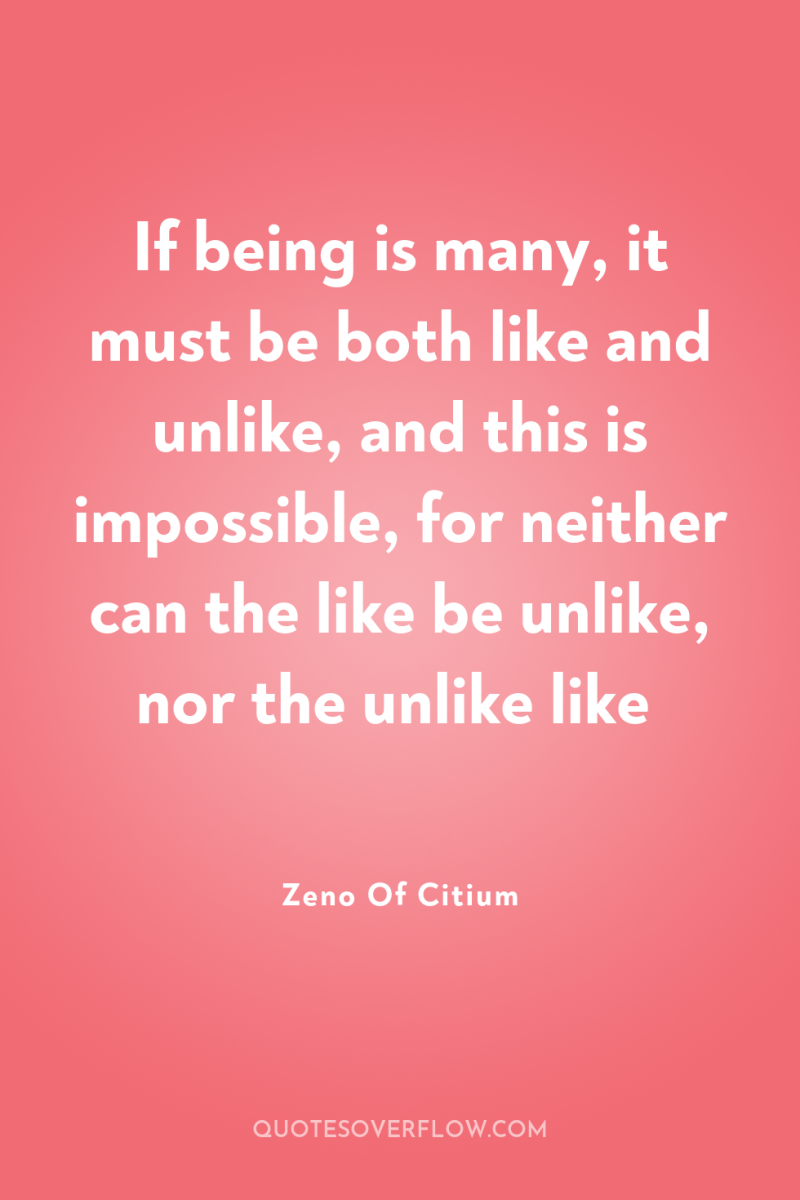
20
If being is many, it must be both like and unlike, and this is impossible, for neither can the like be unlike, nor the unlike likeZeno Of Citium
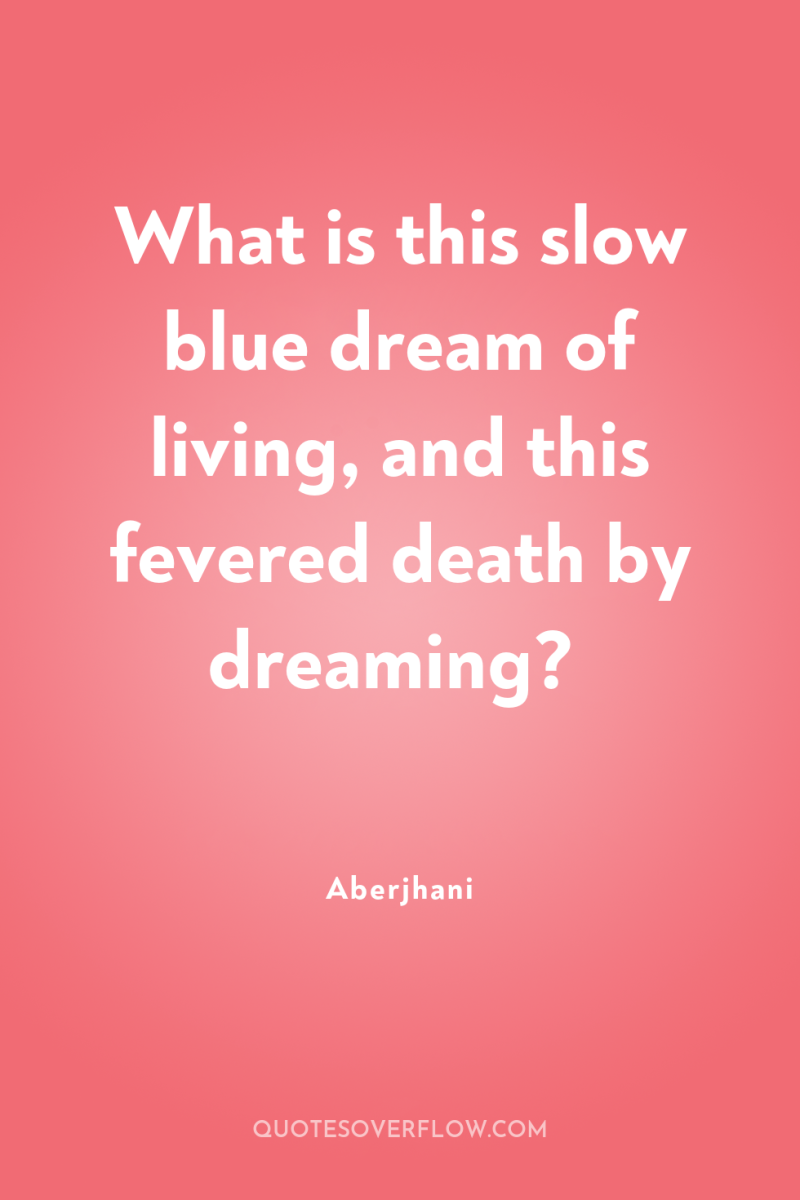
21
What is this slow blue dream of living, and this fevered death by dreaming?Aberjhani
22
In the pragmatist, streetwise climate of advanced postmodern capitalism, with its scepticism of big pictures and grand narratives, its hard-nosed disenchantment with the metaphysical, 'life' is one among a whole series of discredited totalities. We are invited to think small rather than big — ironically, at just the point when some of those out to destroy Western civilization are doing exactly the opposite. In the conflict between Western capitalism and radical Islam, a paucity of belief squares up to an excess of it. The West finds itself faced with a full-blooded metaphysical onslaught at just the historical point that it has, so to speak, philosophically disarmed. As far as belief goes, postmodernism prefers to travel light: it has beliefs, to be sure, but it does not have faith.Terry Eagleton
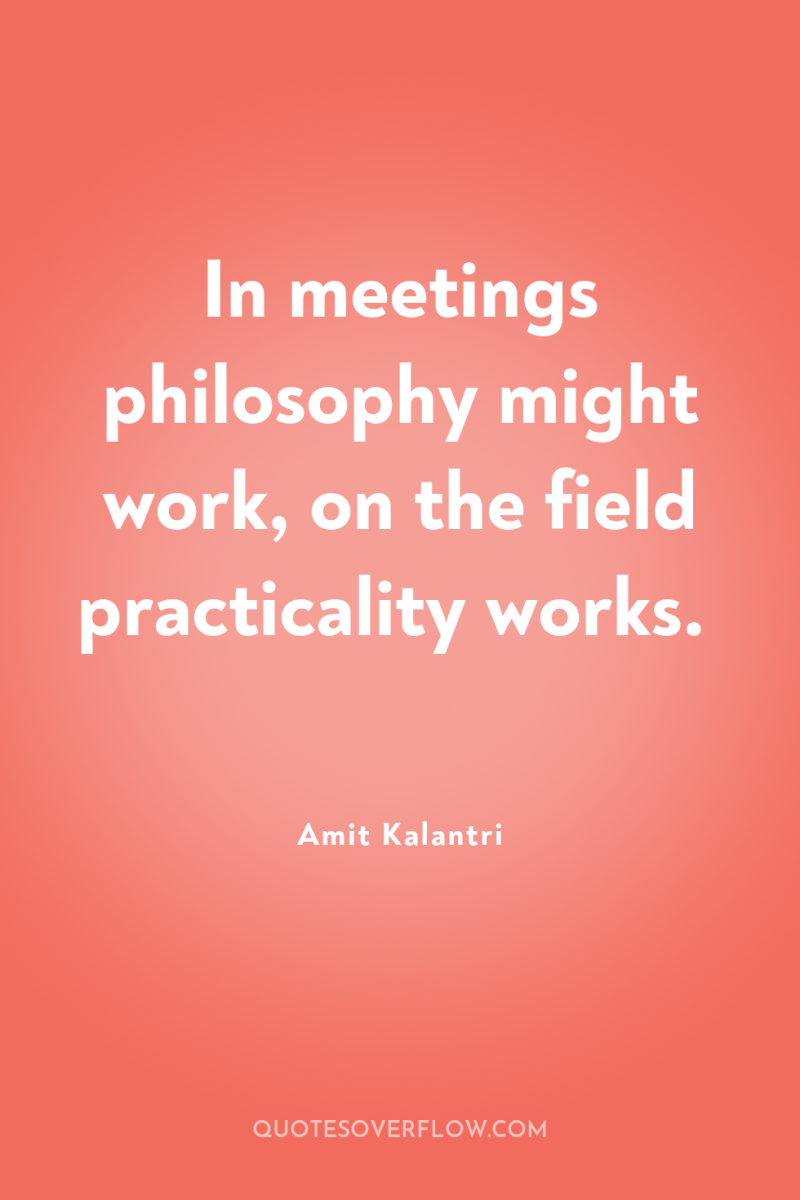
23
In meetings philosophy might work, on the field practicality works.Amit Kalantri
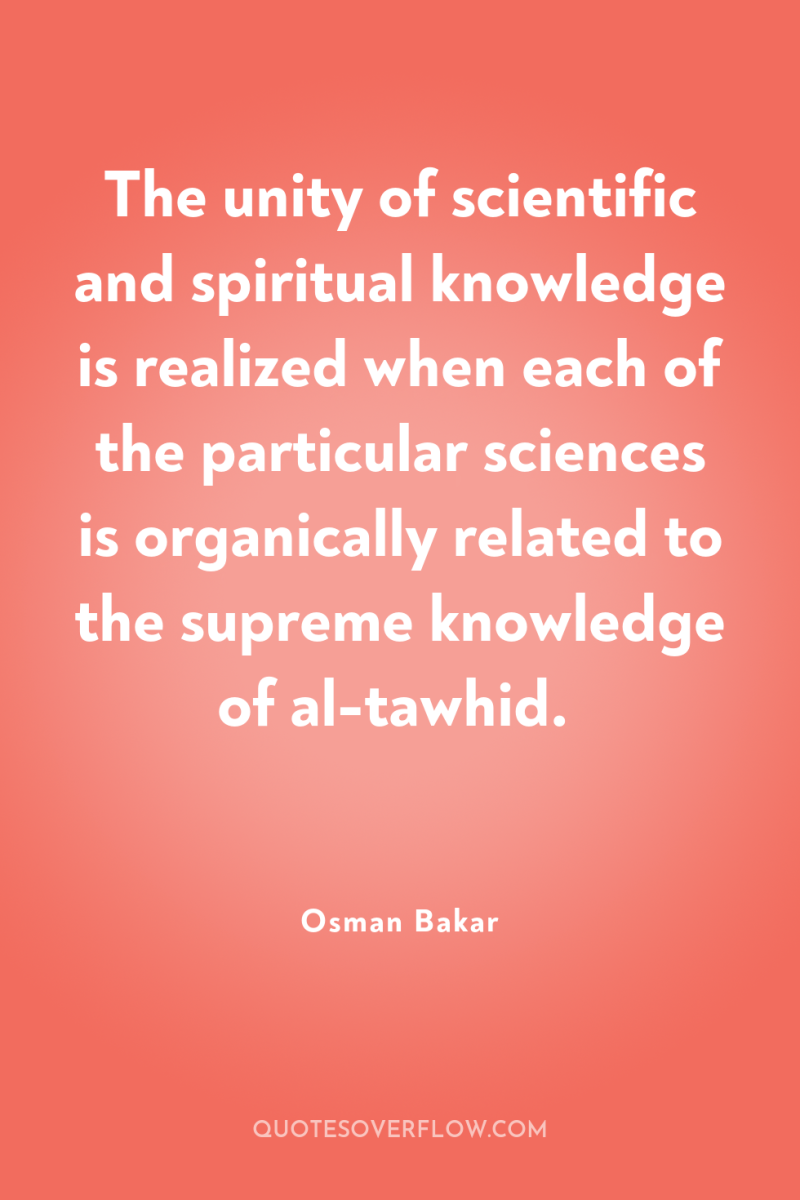
24
The unity of scientific and spiritual knowledge is realized when each of the particular sciences is organically related to the supreme knowledge of al-tawhid.Osman Bakar
25
Rainer Maria Rilke greeted and wrestled with the angels of his Duino Elegies in the solitude of a castle surrounded by white cliffs tall trees and the sea. I greeted most of mine in the solitude of a house that still vibrated with the throbs of a singular life that had helped shape many lives and with the ache of attempts to render useful service to that life. The River of Winged Dreams was therefore constructed as a link between dimensions of past and future emotions and intellect and matter and spirit.Aberjhani
26
The most perfect and satisfactory knowledge is that of perception but this is limited to the absolutely particular, to the individual. The comprehension of the many and the various into *one* representation is possible only through the *concept*, in other words, by omitting the differences; consequently, the concept is a very imperfect way of representing things. The particular, of course, can also be apprehended immediately as a universal, namely when it is raised to the (Platonic) *Idea*; but in this process, which I have analysed in the third book, the intellect passes beyond the limits of individuality and therefore of time; moreover, this is only an exception. These inner and essential imperfections of the intellect are further increased by a disturbance to some extent external to it but yet inevitable, namely, the influence that the *will* exerts on all its operations, as soon as that will is in any way concerned in their result. Every passion, in fact every inclination or disinclination, tinges the objects of knowledge with its colour. Most common of occurrence is the falsification of knowledge brought about by desire and hope, since they show us the scarcely possible in dazzling colours as probable and well-nigh certain, and render us almost incapable of comprehending what is opposed to it. Fear acts in a similar way; every preconceived opinion, every partiality, and, as I have said, every interest, every emotion, and every predilection of the will act in an analogous manner. Finally, to all these imperfections of the intellect we must also add the fact that it grows old with the brain; in other words, like all physiological functions, it loses its energy in later years; in this way all its imperfections are then greatly increased.”–from_ The World as Will and Representation_. Translated from the German by E. F. J. Payne in two volumes: volume II, pp. 139-141.Arthur Schopenhauer
27
To clarify the existentiality of the Self, we take as our ‘natural’ point of departure Dasein’s everyday interpretation of the Self. In *saying* “*I*, ” Dasein expresses itself about ‘itself’. It is not necessary that in doing so Dasein should make any utterance. With the ‘I’, this entity has itself in view. The content of this expression is regarded as something utterly simple. In each case, it just stands for me and nothing further. Also, this ‘I’, as something simple, is not an attribute of other Things; it is not *itself* a predicate, but the absolute ‘subject’. What is expressed and what is addressed in saying “I, ” is always met as the same persisting something. The characteristics of ‘simplicity’, ‘substantiality’, and ‘personality’, which Kant, for instance, made the basis for his doctrine ‘of the paralogisms of pure reason’, arise from a genuine pre-phenomenological experience. The question remains whether that which we have experienced ontically in this way may be Interpreted ontologically with the help of the ‘categories’ mentioned. Kant, indeed, in strict conformity with the phenomenal content given in saying “I, ” shows that the ontical theses about the soul-substance which have been inferred [*erschlossenen*] from these characteristics, are without justification. But in so doing, he merely rejects a wrong *ontical* explanation of the “I”; he has by no means achieved an *ontological* Interpretation of Selfhood, nor has he even obtained some assurance of it and made positive preparation for it. Kant makes a more rigorous attempt than his predecessors to keep hold of the phenomenal content of saying “I”; yet even though in theory he has denied that the ontical foundations of the ontology of the substantial apply to the “I, ” he still slips back into *this same* inappropriate ontology. This will be shown more exactly, in order that we may establish what it means ontologically to take saying “I” as the starting point for the analysis of Selfhood. The Kantian analysis of the ‘I think’ is now to be added as an illustration, but only so far as is demanded for clarifying these problems."―from_ Being and Time_. Translated by John Macquarrie & Edward Robinson, p. 366 .Martin Heidegger
28
The ‘I’ is a bare consciousness, accompanying all concepts. In the ‘I’, ‘nothing more is represented than a transcendental subject of thoughts’. ‘Consciousness in itself (is) not so much a representation…as it is a form of representation in general.’ The ‘I think’ is ‘the form of apperception, which clings to every experience and precedes it.’ Kant grasps the phenomenal content of the ‘I’ correctly in the expression ‘I think’, or–if one also pays heed to including the ‘practical person’ when one speaks of ‘intelligence’–in the expression ‘I take action’. In Kant’s sense we must take saying “I” as saying “I think.” Kant tries to establish the phenomenal content of the “I” as *res cogitans*. If in doing so he calls this “I” a ‘logical subject’, that does not mean that the “I” in general is a concept obtained merely by way of logic. The “I” is rather the subject of logical behavior, of binding together. ‘I think’ means ‘I bind together’. All binding together is an ‘*I* bind together’. In any taking-together or relating, the “I” always underlies–the ὑποκείμενον [hypokeimenon; subjectum; subject]. The *subjectum* is therefore ‘consciousness in itself’, not a representation but rather the ‘form’ of representation. That is to say, the “I think” is not something represented, but the formal structure of representing as such, and this formal structure alone makes it possible for anything to have been represented. When we speak of the “form” of representation, we have in view neither a framework nor a universal concept, but that which, as εἶδοÏ‚ [eidos], makes every representing and everything represented be what it is. If the “I” is understood as the form of representation, this amounts to saying that it is the ‘logical subject’. Kant’s analysis has two positive aspects. For one thing, he sees the impossibility of ontically reducing the “I” to a substance; for another thing, he holds fast to the “I” as ‘I think’. Nevertheless, he takes this “I” as subject again, and he does so in a sense which is ontologically inappropriate. For the ontological concept of the subject *characterizes not the Selfhood of the “I” qua Self, but the self-sameness and steadiness of something that is always present-at-hand*. To define the “I” ontologically as “*subject*” means to regard it as something always present-at-hand. The Being of the “I” is understood as the Reality of the *res cogitans*."―from_ Being and Time_. Translated by John Macquarrie & Edward Robinson, pp. 366-367 .Martin Heidegger
29
But how does it come about that while the ‘I think’ gives Kant a genuine phenomenal starting-point, he cannot exploit it ontologically, and has to fall back on the ‘subject’–that is to say, something *substantial*? The “I” is not just an ‘I think’, but an ‘I think something’. And does not Kant himself keep on stressing that the “I” remains related to its representations, and would be nothing without them? For Kant, however, these representations are the ‘empirical’, which is ‘accompanied’ by the “I”–the appearances to which the “I” ‘clings’. Kant nowhere shows the kind of Being of this ‘clinging’ and ‘accompanying’. At bottom, however, their kind of Being is understood as the constant Being-present-at-hand of the “I” along with its representations. Kant has indeed avoided cutting the “I” adrift from thinking; but he has done so without starting with the ‘I think’ itself in its full essential content as an ‘I think something’, and above all, without seeing what is ontologically ‘presupposed’ in taking the ‘I think something’ as a basic characteristic of the Self. For even the ‘I think something’ is not definite enough ontologically as a starting-point, because the ‘something’ remains indefinite. If by this “something” we understand an entity *within-the-world*, then it tacitly implies that the *world* has been presupposed; and this very phenomenon of the world co-determines the state of Being of the “I, ” if indeed it is to be possible for the “I” to be something like an ‘I think something’. In saying “I, ” I have in view the entity which in each case I am as an ‘I-am-in-a-world’. Kant did not see the phenomenon of the world, and was consistent enough to keep the ‘representations’ apart from the *a priori* content of the ‘I think’. But as a consequence the “I” was again forced back to an *isolated* subject, accompanying representations in a way which is ontologically quite indefinite.* In saying “I, ” Dasein expresses itself as Being-in-the-world*. But does saying “I” in the everyday manner have *itself* in view *as* being-in-the-world [*in-der-Welt-seiend*]? Here we must make a distinction. When saying “I, ” Dasein surely has in view the entity which, in every case, it is itself. The everyday interpretation of the Self, however, has a tendency to understand itself in terms of the ‘world’ with which it is concerned. When Dasein has itself in view ontically, it *fails to see* itself in relation to the kind of Being of that entity which it is itself. And this holds especially for the basic state of Dasein, Being-in-the-world."―from_Being and Time_. Translated by John Macquarrie & Edward Robinson, pp. 367-370 .Martin Heidegger
30
What is the motive for this ‘fugitive’ way of saying “I”? It is motivated by Dasein’s falling; for as falling, it *flees* in the face of itself into the “they.” When the “I” talks in the ‘natural’ manner, this is performed by the they-self. What expresses itself in the ‘I’ is that Self which, proximally and for the most part, I am *not* authentically. When one is absorbed in the everyday multiplicity and the rapid succession [*Sich-jagen] of that with which one is concerned, the Self of the self-forgetful “I am concerned” shows itself as something simple which is constantly selfsame but indefinite and empty. Yet one *is* that with which one concerns oneself. In the ‘natural’ ontical way in which the “I” talks, the phenomenal content of the Dasein which one has in view in the "I" gets overlooked; but this gives *no justification for our joining in this overlooking of it*, or for forcing upon the problematic of the Self an inappropriate ‘categorial’ horizon when we Interpret the “I” ontologically. Of course by thus refusing to follow the everyday way in which the “I” talks, our ontological Interpretation of the ‘I’ has by no means *solved* the problem; but it has indeed *prescribed the direction* for any further inquiries. In the “I, ” we have in view that entity which one is in ‘being-in-the-world’.Being-already-in-a-world, however, as Being-alongside-the-ready-to-hand-within-the-world, means equiprimordially that one is ahead of oneself. With the ‘I’, what we have in view is that entity for which the *issue* is the Being of the entity that it is. With the ‘I’, care expresses itself, though proximally and for the most part in the ‘fugitive’ way in which the “I” talks when it concerns itself with something. The they-self keeps on saying “I” most loudly and most frequently because at bottom it *is not authentically* itself, and evades its authentic potentiality-for- Being. If the ontological constitution of the Self is not to be traced back either to an “I”-substance or to a ‘subject’, but if, on the contrary, the everyday fugitive way in which we keep on saying “I” must be understood in terms of our *authentic* potentiality-for- Being, then the proposition that the Self is the basis of care and constantly present-at-hand, is one that still does not follow. Selfhood is to be discerned existentially only in one’s authentic potentiality-for- Being-one’s- Self–that is to say, in the authenticity of Dasein’s Being *as care*. In terms of care the *constancy of the Self*, as the supposed persistence of the *subjectum*, gets clarified. But the phenomenon of this authentic potentiality-for- Being also opens our eyes for the *constancy of the Self*, in the double sense of steadiness and steadfastness, is the *authentic* counter-possibility to the non- Self-constancy which is characteristic of irresolute falling. Existentially, “*Self-constancy*” signifies nothing other than anticipatory resoluteness. The ontological structure of such resoluteness reveals the existentiality of the Self’s Selfhood."―from_Being and Time_. Translated by John Macquarrie & Edward Robinson, pp. 368-369 .Martin Heidegger
31
Dasein *is authentically itself* in the primordial individualization of the reticent resoluteness which exacts anxiety of itself. *As something that keeps *silent*, authentic *Being*-one’s-Self is just the sort of thing that does not keep on saying ‘I’; but in its reticence it ‘*is*’ that thrown entity as which it can authentically be. The Self which the reticence of resolute existence unveils is the primordial phenomenal basis for the question as to the Being of the ‘I’. Only if we are oriented phenomenally by the meaning of the Being of the authentic potentiality-for- Being-one’s- Self are we put in a position to discuss what ontological justification there is for treating substantiality, simplicity, and personality as characteristics of Selfhood. In the prevalent way of saying “I, ” it is constantly suggested that what we have in advance is a Self-Thing, persistently present-at-hand; the ontological question of the Being of the Self must turn away from any such suggestion.* Care does not need to be founded in a Self. But existentiality, as constitutive for care, provides the ontological constitution of Dasein’s Self-constancy, to which there belongs, in accordance with the full structural content of care, its Being-fallen factically into non- Self-constancy*. When fully conceived, the care-structure includes the phenomenon of Selfhood. This phenomenon is clarified by Interpreting the meaning of care; and it is as care that Dasein’s totality of Being has been defined.”―from_ Being and Time_. Translated by John Macquarrie & Edward Robinson, pp. 369-370.Martin Heidegger
32
Philosophy is like being in a dark room and looking for a black cat. Metaphysics is like being in a dark room and looking for a black cat that isn't there. Theology is like being in a dark room and looking for a black cat that isn't there, and shouting "I found it! " Science is like being in a dark room looking for a black cat while using a flashlight.Anonymous
33
We assert now that Being is the proper and sole theme of philosophy. This is not our own invention; it is a way of putting the theme which comes to life at the beginning of philosophy in antiquity, and it assumes its most grandiose form in Hegel's logic. At present we are merely asserting that Being is the proper and sole theme of philosophy. Negatively, this means that philosophy is not a science of beings but of Being or, as the Greek expression goes, ontology. We take this expression in the widest possible sense and not in the narrower one it has, say, in Scholasticism or in modern philosophy in Descartes and Leibniz.A discussion of the basic problems of phenomenology then is tantamount to providing fundamental substantiation for this assertion that philosophy is the science of Being and establishing how it is such. The discussion should show the possibility and necessity of the absolute science of Being and demonstrate its character in the very process of the inquiry. Philosophy is the theoretical conceptual interpretation of Being, of Being's structure and its possibilities. Philosophy is ontological." ―from_The Basic Problems of Phenomenology_ .Martin Heidegger
34
Our conduct of the ontological investigation in the first and second parts opens up for us at the same time a view of the way in which these phenomenological investigations proceed. This raises the question of the character of method in ontology. Thus we come to the third part of the course: the scientific method of ontology and the idea of phenomenology. The method of ontology, that is, of philosophy in general, is distinguished by the fact that ontology has nothing in common with any method of any of the other sciences, all of which as positive sciences deal with beings. On the other hand, it is precisely the analysis of the truth-character of Being which shows that Being also is, as it were, based in a being, namely, in the Dasein. Being is given only if the understanding of Being, hence the Dasein, exists. This being accordingly lays claim to a distinctive priority in ontological inquiry. It makes itself manifest in all discussions of the basic problems of ontology and above all in the fundamental question of the meaning of Being in general. The elaboration of this question and its answer requires a general analytic of the Dasein. Ontology has for its fundamental discipline the analytic of the Dasein. This implies at the same time that ontology cannot be established in a purely ontological manner. Its possibility is referred back to a being, that is, to something ontical―the Dasein. Ontology has an ontical foundation, a fact which is manifest over and over again in the history of philosophy down to the present. For example, it is expressed as early as Aristotle's dictum that the first science, the science of Being, is theology. As the work of the freedom of the human Dasein, the possibilities and destinies of philosophy are bound up with man's existence, and thus with temporality and with historicality, and indeed in a more original sense than is any other science. Consequently, in clarifying the scientific character of ontology, *the first task is the demonstration of its ontical foundation* and the characterisation of this foundation itself."―from_ The Basic Problems of Phenomenology_.Martin Heidegger
35
Thus with the question of the Being of truth and the necessity of presupposing it, just as with the question of the essence of knowledge, an 'ideal subject' has generally been posited. The motive for this, whether explicit or tacit, lies in the requirement that philosophy should have the '*a priori*' as its theme, rather than 'empirical facts' as such. There is some justification for this requirement, though it still needs to be grounded ontologically. Yet is this requirement satisfied by positing an 'ideal subject'? Is not such a subject *a fanciful idealization*? With such a conception have we not missed precisely the *a priori* character of that merely 'factual' subject, Dasein? Is it not an attribute of the *a priori* character of the factical subject (that is, an attribute of Dasein's facticity) that it is in the truth and in untruth equiprimordially? The ideas of a 'pure "I"' and of a 'consciousness in general' are so far from including the *a priori* character of 'actual' subjectivity that the ontological characters of Dasein's facticity and its state of being are either passed over or not seen at all. Rejection of a 'consciousness in general' does not signify that the *a priori* is negated, any more than the positing of an idealized subject guarantees that Dasein has an *a priori* character grounded upon fact. Both the contention that there are 'eternal truths' and the jumbling together of Dasein's phenomenally grounded 'ideality' with an idealized absolute subject, belong to those residues of Christian theology within philosophical problematics which have not as yet been radically extruded. The Being of truth is connected primordially with Dasein. And only because Dasein is as constituted by disclosedness (that is, by understanding), can anything like Being be understood; only so is it possible to understand Being."―from_Being and Time_. Translated by John Macquarrie & Edward Robinson, p. 272.Martin Heidegger
36
Curiosity is everywhere and nowhere. This mode of Being-in-the-world reveals a new kind of Being of everyday Dasein―a kind in which Dasein is constantly uprooting itself. Idle talk controls even the ways in which one may be curious. It says what one "must" have read and seen. In being everywhere and nowhere, curiosity is delivered over to idle talk. These two everyday modes of Being for discourse and sight are not just present-at-hand side by side in their tendency to uproot, but *either* of these ways-to-be drags the *other* one with it. Curiosity, for which nothing is closed off, and idle talk, for which there is nothing that is not understood, provide themselves (that is, the Dasein which is in this manner [*dem so seienden Dasein*]) with the guarantee of a 'life' which, supposedly, is genuinely 'lively'. But with this supposition a third phenomenon now shows itself, by which the disclosedness of everyday Dasein is characterized."―from_ Being and Time_. Translated by John Macquarrie & Edward Robinson, p. 217.Martin Heidegger
37
Human existence can relate to beings only if it holds itself out into the nothing. Going beyond beings occurs in the essence of Dasein. But this going beyond is metaphysics itself. This implies that metaphysics belongs to the "nature of man." It is neither a division of academic philosophy nor a field of arbitrary notions. Metaphysics is the basic occurrence of Dasein. It is Dasein itself. Because the truth of metaphysics dwells in this groundless ground it stands in closest proximity to the constantly lurking possibility of deepest error. For this reason no amount of scientific rigor attains to the seriousness of metaphysics. Philosophy can never be measured by the standard of the idea of science. If the question of the nothing unfolded here has actually questioned us, then we have not simply brought metaphysics before us in an extrinsic manner. Nor have we merely been "transposed" to it. We cannot be transposed there at all, because insofar as we exist we are always there already. "For by nature, my friend, man's mind dwells in philosophy" (Plato, Phaedrus, 279a). So long as man exists, philosophizing of some sort occurs. Philosophy―what we call philosophy―is metaphysics getting under way, in which philosophy comes to itself and to its explicit tasks. Philosophy gets under way only by a peculiar insertion of our own existence into the fundamental possibilities of Dasein as a whole. For this insertion it is of decisive importance, first, that we allow space for beings as a whole; second, that we release ourselves into the nothing, which is to say, that we liberate ourselves from those idols everyone has and to which he is wont to go cringing; and finally, that we let the sweep of our suspense take its full course, so that it swings back into the basic question of metaphysics which the nothing itself compels: 'Why are there beings at all, and why not rather nothing?'"―from_ What is Metaphysics?_ .Martin Heidegger
38
Among the objections to the reality of objects of sense, there is one which is derived from the apparent difference between matter as it appears in physics and things as they appear in sensation. Men of science, for the most part, are willing to condemn immediate data as "merely subjective, " while yet maintaining the truth of the physics inferred from those data. But such an attitude, though it may be *capable* of justification, obviously stands in need of it; and the only justification possible must be one which exhibits matter as a logical construction from sense-data―unless, indeed, there were some wholly *a priori* principle by which unknown entities could be inferred from such as are known. It is therefore necessary to find some way of bridging the gulf between the world of physics and the world of sense, and it is this problem which will occupy us in the present lecture. Physicists appear to be unconscious of the gulf, while psychologists, who are conscious of it, have not the mathematical knowledge required for spanning it. The problem is difficult, and I do not know its solution in detail. All that I can hope to do is to make the problem felt, and to indicate the kind of methods by which a solution is to be sought."―from_ Our Knowledge of the External World_, p. 107.Betrand Russell
39
Our critique is not opposed to the *dogmatic procedure* of reason in its pure knowledge as science (for science must always be dogmatic, that is, derive its proof from secure *a priori* principles), but only to *dogmatism*, that is, to the presumption that it is possible to make any progress with pure (philosophical) knowledge from concepts according to principles, such as reason has long been in the habit of using, without first inquiring in what way, and by what right, it has come to posses them. Dogmatism is therefore the dogmatic procedure of pure reason, *without a preceding critique of its own powers*; and our opposition to this is not intended to defend that loquacious shallowness which arrogates to itself the name of popularity, much less that skepticism which makes short work of the whole of metaphysics. On the contrary, our critique is meant to form a necessary preparation in support of metaphysics as a thorough science, which must necessarily be carried out dogmatically and strictly systematically, so as to satisfy all the demands, no so much of the public at large, as of the Schools. This is an indispensable demand for it has undertaken to carry out its work entirely *a priori*, and thus to carry it out to the complete satisfaction of speculative reason. In the execution of this plan, as traced out by the critique, that is, in a future system of metaphysics, we shall have to follow the strict method of the celebrated Wolff, the greatest of all dogmatic philosophers. He was the first to give an example (and by his example initiated, in Germany, that spirit of thoroughness which is not yet extinct) of how the secure course of a science could be attained only through the lawful establishment of principles, the clear determination of concepts, the attempt at strictness of proof and avoidance of taking bold leaps in our inferences. He was therefore most eminently qualified to give metaphysics the dignity of a science, if it had only occurred to him to prepare his field in advance by criticism of the organ, that is, of pure reason itself―an omission due not so much to himself as to the dogmatic mentality of his age, about which the philosophers of his own, as well as of all previous times, have no right to reproach one another. Those who reject both the method of Wolff and the procedure of the critique of pure reason can have no other aim but to shake off the fetters of *science* altogether, and thus to change work into play, certainty into opinion and philosophy into philodoxy." ―from_Critique of Pure Reason_. Preface to the Second Edition. Translated, edited, and with an Introduction by Marcus Weigelt, based on the translation by Max Müller, pp. 28-29 .Immanuel Kant
40
Philosophy is metaphysics. Metaphysics thinks beings as a whole―the world, man, God―with respect to Being, with respect to the belonging together of beings in Being. Metaphysics thinks beings as being in the manner of representational thinking which gives reasons. For since the beginning of philosophy and with that beginning, the Being of beings has showed itself as the ground (arche, aition, principle). The ground is that from which beings as such are what they are in their becoming, perishing, and persisting as something that can be known, handled, and worked upon. As the ground, Being brings beings to their actual presencing. The ground shows itself as presence. The present of presence consists in the fact that it brings what is present each in its own way to presence. In accordance with the actual kind of presence, the ground has the character of grounding as the ontic causation of the real, as the transcendental making possible of the objectivity of objects, as the dialectical mediation of the movement of the absolute Spirit and of the historical process of production, as the will to power positing values."―from_ The End of Philosophy and the Task of Thinking_ .Martin Heidegger
41
Metaphysics thinks about beings as beings. Wherever the question is asked what beings are, beings as such are in sight. Metaphysical representation owes this sight to the light of Being. The light itself, i.e., that which such thinking experiences as light, does not come within the range of metaphysical thinking; for metaphysics always represents beings only as beings. Within this perspective, metaphysical thinking does, of course, inquire into the being which is the source and originator of this light. But the light itself is considered sufficiently illuminated as soon as we recognize that we look through it whenever we look at beings. In whatever manner beings are interpreted―whether as spirit, after the fashion of spiritualism; or as becoming and life, or idea, will, substance, subject, or *energeia*; or as the eternal recurrence of the same events―every time, beings as beings appear in the light of Being. Wherever metaphysics represents beings, Being has entered into the light. Being has arrived in a state of unconcealedness (aletheia). But whether and how Being itself involves such unconcealedness, whether and how it manifests itself in, and as, metaphysics, remains obscure. Being in its revelatory essence, i.e., in its truth, is not recalled. Nevertheless, when metaphysics gives answers to its question concerning beings as such, metaphysics speaks out of the unnoticed revealedness of Being. The truth of Being may thus be called the ground in which metaphysics, as the root of the tree of philosophy, is kept and from which it is nourished. Because metaphysics inquires about beings as beings, it remains concerned with beings and does not devote itself to Being as Being. As the root of the tree, it sends all nourishment and all strength into the trunk and its branches. The root branches out in the soil to enable the tree to grow out of the ground and thus to leave it. The tree of philosophy grows out of the soil in which metaphysics is rooted. The ground is the element in which the root of the tree lives, but the growth of the tree is never able to absorb this soil in such a way that it disappears in the tree as part of the tree. Instead, the roots, down to the subtlest tendrils, lose themselves in the soil. The ground is ground for the roots, and in the ground the roots forget themselves for the sake of the tree.. Metaphysics, insofar as it always represents only beings as beings, does not recall Being itself. Philosophy does not concentrate on its ground. It always leaves its ground―leaves it by means of metaphysics. And yet, it never escapes its ground.. Insofar as a thinker sets out to experience the ground of metaphysics, insofar as the attempts to recall the truth of Being itself instead of merely representing beings as beings, his thinking has in a sense left metaphysics. From the point of view of metaphysics, such thinking goes back into the ground of metaphysics."―from_ The Way Back to the Ground of Metaphysics_ .Martin Heidegger
42
Human existence can relate to beings only if it holds itself out into the nothing. Going beyond beings occurs in the essence of Dasein. But this going beyond is metaphysics itself. This implies that metaphysics belongs to the "nature of man." It is neither a division of academic philosophy nor a field of arbitrary notions. Metaphysics is the basic occurrence of Dasein. It is Dasein itself. Because the truth of metaphysics dwells in this groundless ground it stands in closest proximity to the constantly lurking possibility of deepest error. For this reason no amount of scientific rigor attains to the seriousness of metaphysics. Philosophy can never be measured by the standard of the idea of science. If the question of the nothing unfolded here has actually questioned us, then we have not simply brought metaphysics before us in an extrinsic manner. Nor have we merely been "transposed" to it. We cannot be transposed there at all, because insofar as we exist we are always there already. "For by nature, my friend, man's mind dwells in philosophy" (Plato, Phaedrus, 279a). So long as man exists, philosophizing of some sort occurs. Philosophy―what we call philosophy―is metaphysics getting under way, in which philosophy comes to itself and to its explicit tasks. Philosophy gets under way only by a peculiar insertion of our own existence into the fundamental possibilities of Dasein as a whole. For this insertion it is of decisive importance, first, that we allow space for beings as a whole; second, that we release ourselves into the nothing, which is to say, that we liberate ourselves from those idols everyone has and to which he is wont to go cringing; and finally, that we let the sweep of our suspense take its full course, so that it swings back into the basic question of metaphysics which the nothing itself compels: 'Why are there beings at all, and why not rather nothing?"―from_ What is Metaphysics?_ .Martin Heidegger

43
With his night-cap and his night-shirt tatters, He botches up the loop-holes in the structure of the world.Heinrich Heine
44
By this freedom the will of a rational being, as belonging to the sensuous world, recognizes itself to be, like all other efficient causes, necessarily subject to the laws of causality, while in practical matters, in its other aspect as a being in itself, it is conscious of its existence as determinable in an intelligible order of things. It is conscious of this not by virtue of a particular intuition of itself but because of certain dynamic laws which determine its causality in the world of sense, for it has been sufficiently proved in another place that if freedom is attributed to us, it transfers us into an intelligible order of things."―from_ Critique of Practical Reason_. Translated, with an Introduction by Lewis White Beck, p. 43. .Immanuel Kant
45
On the other hand, the moral law, although it gives no such prospect, does provide a fact absolutely inexplicable from any data of the world of sense or from the whole compass of the theoretical use of reason, and this fact points to a pure intelligible world―indeed, it defines it positively and enable us to know something of it, namely a law. This law gives to the sensible world, as sensuous nature (as this concerns rational beings), the form of an intelligible world, i.e., the form of supersensuous nature, without interfering with the mechanism of the former. Nature, in the widest sense of the word, is the existence of things under laws. The sensuous nature of rational beings in general is their existence under empirically conditioned laws, and therefore it is, from the point of view of reason, heteronomy. The supersensuous nature of the same beings, on the other hand, is their existence according to laws which are independent of all empirical conditions and which therefore belong to the autonomy of pure reason. And since the laws, according to which the existence of things depends on cognition, are practical, supersensuous nature, so far as we can form a concept of it, is nothing else than nature under the autonomy of the pure practical reason. The law of this autonomy is the moral law, and it, therefore, is the fundamental law of supersensuous nature and of a pure world of the understanding, whose counterpart must exist in the world of sense without interfering with the laws of the latter. The former could be called the archetypal world (*natura archetypa*) which we know only by reason; the latter, on the other hand, could be called the ectypal world (*natura ectypa*), because it contains the possible effect of the idea of the former as the determining ground of the will."―from_ Critique of Practical Reason_. Translated, with an Introduction by Lewis White Beck, p. 44. .Immanuel Kant
46
Metaphysics, a completely isolated and speculative branch of rational knowledge which is raised above all teachings of experience and rests on concepts only (not, like mathematics, on their application to intuition), in which reason therefore is meant to be its own pupil, has hitherto not had the good fortune to enter upon the secure path of a science, although it is older than all other sciences, and would survive even if all the rest were swallowed up in the abyss of an all-destroying barbarism. Reason in metaphysics, even if it tries, as it professes, only to gain *a priori* insight into those laws which are confirmed by our most common experience, is constantly being brought to a standstill, and we are obliged again and again to retrace our steps, as they do not lead us where we want to go. As to unanimity among its participants, there is so little of it in metaphysics that it has rather become an arena that would seem especially suited for those who wish to exercise themselves in mock fights, where no combatant has as yet succeeded in gaining even an inch of ground that he could call his permanent possession. There cannot be any doubt, therefore, that the method of metaphysics has hitherto consisted in a mere random groping, and, what is worst of all, in groping among mere concepts. What, then, is the reason that this secure scientific course has not yet been found? Is this, perhaps, impossible? Why, in that case, should nature have afflicted our reason with the restless aspiration to look for it, and have made it one of its most important concerns? What is more, how little should we be justified in trusting our reason, with regard to one of the most important objects of which we desire knowledge, it not only abandons us, but lures us on by delusions, and in the end betrays us! Or, if hitherto we have only failed to meet with the right path, what indications are there to make us hope that, should we renew our search, we shall be more successful than others before us?"―from_ Critique of Pure Reason_. Preface to the Second Edition. Translated, edited, and with an Introduction by Marcus Weigelt, based on the translation by Max Müller, p. 17 .Immanuel Kant
47
A similar experiment may be tried in metaphysics as regards the *intuition* of objects. If the intuition had to conform to the constitution of objects, I would not understand how we could know anything of them *a priori*; but if the object (as object of the senses) conformed to the constitution of our faculty of intuition, I could very well conceive such a possibility. As, however, I cannot rest in these intuitions if they are to become knowledge, but have to refer them as representations, to something as their object, and must determine this object through them, I can assume either that the *concepts* through which I arrive at this determination also conform to the object, and I would again be as perplexed about how I can know anything about it *a priori*; or else that the objects, or what is the same thing, the *experience* in which alone they are known (as objects that are given to us), conform to those concepts. In the latter case, I recognize an easier solution because experience itself is a kind of knowledge that requires understanding; and this understanding has its rules which I must presuppose as existing within me even before objects are given to me, and hence *a priori*. These rules are expressed in *a priori* concepts to which all objects of experience must necessarily conform, and with which they must agree. With regard to objects, insofar as they are thought merely through reason and thought indeed as necessary, and which can never, at least not in the way in which reason thinks them, be given in experience, the attempts at thinking them (for they must admit of being thought) will subsequently furnish an excellent touchstone of what we are adopting as our new method of thought, namely, that we know of things *a priori* only that which we ourselves put into them."―from_ Critique of Pure Reason_. Preface to the Second Edition. Translated, edited, and with an Introduction by Marcus Weigelt, based on the translation by Max Müller, pp. 18-19 .Immanuel Kant
48
This experiment succeeds as hoped and promises to metaphysics, in its first part, which deals with those *a priori* concepts to which the corresponding objects may be given in experience, the secure course of a science. For by thus changing our point of view, the possibility of *a priori* knowledge can well be explained, and, what is still more, the laws which *a priori* lie at the foundation of nature, as the sum total of the objects of experience, may be supplied with satisfactory proofs, neither of which was possible within the procedure hitherto adopted. But there arises from this deduction of our faculty of knowing *a priori*, as given in the first part of metaphysics, a somewhat startling result, apparently most detrimental to that purpose of metaphysics which has to be treated in its second part, namely the impossibly of using this faculty to transcend the limits of possible experience, which is precisely the most essential concern of the science of metaphysics. But here we have exactly the experiment which, by disproving the opposite, establishes the truth of the first estimate of our *a priori* rational knowledge, namely, that it is directed only at appearances and must leave the thing in itself as real for itself but unknown to us. For that which necessarily impels us to to go beyond the limits of experience and of all appearances is the *unconditioned*, which reason rightfully and necessarily demands, aside from everything conditioned, in all things in themselves, so that the series of conditions be completed. If, then, we find that, under the supposition that our empirical knowledge conforms to objects as things in themselves, the unconditioned *cannot be thought without contradiction*, while under the supposition that our representation of things as they are given to us does not conform to them as things in themselves, but, on the contrary, that these objects as appearance conform to our mode of representation, then *the contradiction vanishes*; and if we find, therefore, that the unconditioned cannot be encountered in things insofar as we are acquainted with them (insofar as they are given to us), but only in things insofar as we are not acquainted with them, that is, insofar as they are things in themselves; then it becomes apparent that what we at first assumed only for the sake of experiment is well founded. However, with speculative reason unable to make progress in the field of the supersensible, it is still open to us to investigate whether in reason's practical knowledge data may not be found which would enable us to determine that transcendent rational concept of the unconditioned, so as to allow us, in accordance with the wish of metaphysics, to get beyond the limits of all possible experience with our *a priori* knowledge, which is possible in practical matters only. Within such a procedure, speculative reason has always at least created a space for such an expansion, even if it has to leave it empty; none the less we are at liberty, indeed we are summoned, to fill it, if we are able to do so, with practical *data* of reason."―from_ Critique of Pure Reason_. Preface to the Second Edition. Translated, edited, and with an Introduction by Marcus Weigelt, based on the translation by Max Müller, pp. 19-21 .Immanuel Kant
49
The purpose of this critique of pure speculative reason consists in the attempt to change the old procedure of metaphysics, and to bring about a complete revolution after the example set by geometers and investigators of nature. This critique is a treatise on the method, not a system of the science itself; but nevertheless it marks out the whole plan of this science, both with regard to its limits and with regard to its inner organization. For it is peculiar to pure speculative reason that it is able, indeed bound, to measure its own powers according to the different ways in which it chooses its objects for thought, and to enumerate exhaustively the different ways of choosing its problems, thus tracing a complete outline of a system of metaphysics. This is due to the fact that, with regard to the first point, nothing can be attributed to objects in *a priori* knowledge, except what the thinking subject takes from within itself; while, with regard to the second point, pure reason, as far as its principles of knowledge are concerned, forms a separate and independent unity, in which, as in an organized body, every member exists for the sake of all the others, and all the others exist for the sake of the one, so that no principle can be safely applied in *one* relation unless it has been carefully examined in *all* its relations to the whole use of pure reason. Hence, too, metaphysics has this singular advantage, an advantage which cannot be shared by any other rational science which has to deal with objects (for *logic* deals only with the form of thought in general), that if by means of this critique it has been set upon the secure course of a science, it can exhaustively grasp the entire field of knowledge pertaining to it, and can thus finish its work and leave it to posterity as a capital that can never be added to, because it has to deal only with principles and with the limitations of their use, as determined by these principles themselves. And this completeness becomes indeed an obligation if metaphysics is to be a fundamental science, of which we must be able to say, *nil actum reputants, si quid superesset agendum* [to think that nothing was done for as long as something remained to be done]." ―from_Critique of Pure Reason_. Preface to the Second Edition. Translated, edited, and with an Introduction by Marcus Weigelt, based on the translation by Max Müller, pp. 21-22 .Immanuel Kant
50
We have seen, therefore, that I am not allowed even to *assume*, for the sake of the necessary practical use of my reason *God, freedom, immortality*, unless at the same time *I deprive* speculative reason of its pretensions to transcendent insights. Reason, namely, in order to arrive at these, must employ principles which extend only to objects of possible experience, and which, if in spite of this they are applied also to what cannot be an object of experience, actually always change this into an appearance, thus rendering all practical *expansion* of pure reason impossible. Hence I had to suspend *knowledge* in order to make room for *belief*. For the dogmatism of metaphysics without a preceding critique of pure reason, is the source of all that disbelief which opposes morality and which is always very dogmatic." ―from_Critique of Pure Reason_. Preface to the Second Edition. Translated, edited, and with an Introduction by Marcus Weigelt, based on the translation by Max Müller, pp. 25-26.Immanuel Kant
51
What is gained by the transcendence of the object is the identifiability of the object in a plurality of acts and the identifiability of what is thought by several individuals. This identifiability is not restricted to ideal objects, which are generated according to a definite operational law and are therefore producible by everyone out of the same material of intuition which is given prior to any particular sense-experience. The identifiability obtains in precisely the same way for objects of myth and folklore, of belief and artistic fantasy. Goethe’s Faust, Apollo, and Little Red Riding Hood can be identified by several individuals and are the objects of common, universally valid statements. Indeed, exact identity of the nature of the object in question and evidential knowledge of this identity can occur *only* in the case of ideal objects. Our certainty that we all think the same number 3 in the strictest identity of its nature is much more evident than that we all think the same real object, a tree, for instance. In the case of real objects we can actually prove that it is impossible for the momentary content in which the object is represented and thought to be exactly the same in a plurality of acts and for many individuals. The only other contribution made by the fact of the consciousness of transcendence, so long overlooked in recent philosophy, to the problem of reality is this: the acts in which this consciousness is present can bring the givenness of reality, of which we shall speak later, into “objective” form, and can therefore elevate that which is given in this way as real to the status of a real “object.” But with this, the contribution of the consciousness of transcendence to the problem of reality is at an end. Although N. Hartmann made the same point with respect to Paul Linke’s otherwise shrewd and pertinent comments on his doctrine of reality, still we should emphasize that the transcendence of the object does not *exclude* the reality of the object, not even of the *same* object in the strict sense of “same.” ―from_Idealism and Realism_.Max Scheler
52
There appears to be a fifth way, that of eminence. According to this I argue that it is incompatible with the idea of a most perfect being that anything should excel it in perfection (from the corollary to the fourth conclusion of the third chapter) . Now there is nothing incompatible about a finite thing being excelled in perfection; therefore, etc. The minor is proved from this, that to be infinite is not incompatible with being; but the infinite is greater than any finite being. Another formulation of the same is this. That to which intensive infinity is not repugnant is not all perfect unless it be infinite, for if it is finite, it can be surpassed, since infinity is not repugnant to it. But infinity is not repugnant to being, therefore the most perfect being is infinite. The minor of this proof, which was used in the previous argument, [1] cannot, it seems, be proven *a priori*. For, just as contradictories by their very nature contradict each other and their opposition cannot be made manifest by anything more evident, so also these terms [viz. "being" and "infinite"] by their very nature are not repugnant to each other. Neither does there seem to be any way of proving this except by explaining the meaning of the notions themselves. "Being" cannot be explained by anything better known than itself. "Infinite" we understand by means of finite. I explain "infinite" in a popular definition as follows: The infinite is that which exceeds the finite, not exactly by reason of any finite measure, but in excess of any measure that could be assigned.–[2] The following persuasive argument can be given for what we intend to prove. Just as everything is assumed to be possible if its impossibility is not apparent, so also all things are assumed to be compatible if their incompatibility is not manifest. Now there is no incompatibility apparent here, for it is not of the nature of being to be finite; nor does finite appear to be an attribute coextensive with being. But if they were mutually repugnant, it would be for one or the other of these reasons. The coextensive attributes which being possesses seem to be sufficiently evident.–[3] A third persuasive argument is this. Infinite in its own way is not opposed to quantity (that is, where parts are taken successively); therefore, neither is infinity, in its own way, opposed to entity (that is, where perfection exists simultaneously) .–[4] If the quantity characteristic of power is simply more perfect than that characteristic of mass, why is it possible to have an infinity [of parts] in mass and not an infinite power? And if an infinite power is possible, then it actually exists (from the fourth conclusion of the third chapter).–[5] The intellect, whose object is being, finds nothing repugnant about the notion of something infinite. Indeed, the infinite seems to be the most perfect thing we can know. Now if tonal discord so easily displeases the ear, it would be strange if some intellect did not clearly perceive the contradiction between infinite and its first object [viz. being] if such existed. For if the disagreeable becomes offensive as soon as it is perceived, why is it that no intellect naturally shrinks from infinite being as it would from something out of harmony with, and even destructive of, its first object?"–from_ A Treatise on God as First Principle_, 4.63-4.64 .John Duns Scotus
53
It will be seen how there can be the idea of a special science, the *critique of pure reason* as it may be called. For reason is the faculty which supplies the *principles* of *a priori* knowledge. Pure reason therefore is that which contains the principles of knowing something entirely *a priori*. An *organon* of pure reason would be the sum total of the principles by which all pure *a priori* knowledge can be acquired and actually established. Exhaustive application of such an organon would give us a system of pure reason. But as this would be a difficult task, and as at present it is still doubtful whether indeed an expansion of our knowledge is possible here at all, we may regard a science that merely judges pure reason, its sources and limits, as the *propaedeutic* to the system of pure reason. In general, it would have to be called only a *critique*, not a *doctrine* of pure reason. Its utility, in regard to speculation, would only be negative, for it would serve only to purge rather than to expand our reason, and, which after all is a considerable gain, would guard reason against errors. I call all knowledge *transcendental* which deals not so much with objects as with our manner of knowing objects insofar as this manner is to be possible *a priori*. A system of such concepts would be called *transcendental philosophy*. But this is still, as a beginning, too great an undertaking. For since such a science must contain completely both analytic and synthetic *a priori* knowledge, it is, as far as our present purpose is concerned, much too comprehensive. We will be satisfied to carry the analysis only so far as is indispensably necessary in order to understand in their whole range the principles of *a priori* synthesis, with which alone we are concerned. This investigation, which properly speaking should be called only a transcendental critique but not a doctrine, is all we are dealing with at present. It is not meant to expand our knowledge but only to correct it, and to become the touchstone of the value, or lack of value, of all *a priori* knowledge. Such a critique is therefore the preparation, as far as possible, for a new organon, or, if this should turn out not to be possible, for a canon at least, according to which, thereafter, the complete system of a philosophy of pure reason, whether it serve as an expansion or merely as a limitation of its knowledge, may be carried out both analytically and synthetically. That such a system is possible, indeed that it need not be so comprehensive as to cut us off from the hope of completing it, may already be gathered from the fact that it would have to deal not with the nature of things, which is inexhaustible, but with the understanding which makes judgments about the nature of things, and with this understanding again only as far as its *a priori* knowledge is concerned. The supply of this *a priori* knowledge cannot be hidden from us, as we need not look for it outside the understanding, and we may suppose this supply to prove sufficiently small for us to record completely, judge as to its value or lack of value and appraise correctly. Still less ought we to expect here a critique of books and systems of pure reason, but only the critique of the faculty of pure reason itself. Only once we are in possession of this critique do we have a reliable touchstone for estimating the philosophical value of old and new works on this subject. Otherwise, an unqualified historian and judge does nothing but pass judgments upon the groundless assertions of others by means of his own, which are equally groundless.Immanuel Kant
54
It is very important to note that the transcendence of the object is by no means a primitive component necessarily ingredient in all knowledge. It is missing in all ecstatic knowledge. In ecstatic knowledge the known world is still not objectively given. Only when the (logically and genetically simultaneous) act furnishing ecstatic knowledge and the subject which performs this act become themselves the content of knowledge in the act of reflection does the character originally given in ecstatic knowledge become a mere reference pointing to the “object.” It is only here that the object or that which turns into an object remains from now on “transcendent” to consciousness. Therefore, whenever there is consciousness, objects transcendent to consciousness must also be given to consciousness. Their structural relationship is indissoluble. Whenever self-consciousness and consciousness of an object arise, they do so simultaneously and through the same process. The categorical form of an object is not first impressed in a judgment upon a nonobjective given, not even in a one-term, simple judgment, as some people have thought (e.g., Heinrich Maier in his book *Wahrheit und Wirklichkeit*). This is a pure construction. Consciousness of an object precedes all judgment and is not originally constituted by judgment. The same holds true of consciousness of states of affairs. The consciousness of an object and the intentional object are not the result of an active [tätige] “forming” or “imprinting” which we perform on the given through judgments or any other operations of thought. On the contrary, they are the result of a pulling back, the result, that is, of the re-flexive act, in which an originally ecstatic [*ekstatisch gebender*] act turns back knowingly onto itself and comes upon a central self as its starting point. This central self can be given at every level and degree of “concentration” and “collectedness” in “self-consciousness.” What we had hold of [*das Gehabte*] remains “as” object, while the act of reflection turns the knowing back into the knower, as the result of a turning away [*Abwendung*] and a pulling back, and not of an active turning to [*Zuwendung*].From what has been said, one may very well imagine that the real world could be abolished without consciousness and the self being altered or abolished thereby. But this could in no way be the case with the world of objects that transcend consciousness. Descartes as well as Lotze misunderstood this. Where a *cogito* exists, there must also be a *cogitatur* in which a transcendent object is thought. Only a being capable of reflection (*reflexio*) and self-consciousness *can* have objects. Charlotte Bühler has recently made it seem probable that the infant does not yet possess objective consciousness. In waking from the effects of a drug we can follow the process by which the givenness of the surrounding world becomes objective again. There is one last point of contact between the problem of reality and the consciousness of transcendence. The consciousness of transcendence, as already indicated, shows how the mere ecstatic possession of reality on the level of the immediately experienced resistance of an X to the central drives of life passes over into a reflexive and thus objective possession of reality. And we find similar transitions between ecstatic remembering which is merged in the being of what is past and reflexive remembering, between ecstatic drive activities and recurrent deliberation [*Besinnung*], between ecstatic surrender to a value and objectification of a value, between identifying with an alter ego and “understanding” [*Verstehen*] another, however slightly.” ―from_Idealism and Realism_ .Max Scheler
55
The third preliminary problem for every theory of reality is that of the experience of transcendence. We saw in the case of Berkeley that his erroneous principle *percipi est esse*, and his assertion that any being which we think, just for the reason that it is thought, cannot at the same time be regarded as subsisting independently of thinking, incorporate a failure to recognize the consciousness of transcendence peculiar to all intentional acts. This is an instance of the failure to recognize that not only all thinking in the narrower sense, in the sense of grasping an object on the basis of “meanings” and grasping a state of affairs through judgments, but *every* intention in general, whether perception, representation, remembering, the feeling of value, or the posing of ends and goals, points beyond the act and the contents of the act and intends something other than the act [*ein Aktfremdes*], even when what is thought is in turn itself a thought. Indeed, *intentio* signifies a goal-directed movement toward something which one does not have oneself or has only partially and incompletely. Berkeley (following Locke, who was the first to make the basic philosophical error which introduced “psychologism” into epistemology) arrived at the principle *esse est percipi* by making the idea [*Vorstellung*] (and even the sensation) into a thing, an immaterial substance, and by failing to distinguish between the act, the content of an act, and the object. Furthermore, Berkeley confused the being of objects with the fact of being-an-object, even though the latter has only a loose and variable connection with the former. On the other hand, the transcendence of the intentional object with respect to both the *intentio* and its present content is common to every instance of being-an-object. It is, for instance, proper to objects of pure mathematics which are certainly not real but ideal (for example, the number 3). These are produced from the *a priori* material of intuition in accordance with an operational law governing the steps of our thought or intuition. Transcendence is further proper to all fictitious objects and even to contradictory objects, for instance, a square circle. All these sorts of objects, e.g., the golden mountain or Little Red Riding Hood, satisfy the basic principle of the transcendence of objects over and above that aspect of them which is, at any moment, given in consciousness, just as much as do real objects existing independently of all consciousness and knowledge."―from_ Idealism and Realism_ .Max Scheler
56
It is precisely because the principle of the transcendence of the object is completely independent of the existential status of the objects themselves and, thus, independent of the question whether they are produced by us or subsist on their own―whether they are fictions or real beings―that the fact of the consciousness of transcendence is not even remotely qualified to solve the problem of reality. This has been misunderstood equally by W. Freytag, Edith Landmann, P. Linke, and even by Husserl himself. Indeed, people have wanted to speak of an intentional realism (E. Landmann) in contrast to Critical Realism and to all other forms of realism. N. Hartmann was quite correct in emphasizing, in opposition to this, that the projection [*Hinausragen*] of the intentional object beyond the content of consciousness and its act cannot make the least contribution to solving the problem of realism. If something is an intentional object, we cannot recognize from this fact alone, whether it is real or not. If the perceived cherry, the conceived triangle, a friend’s visit anticipated in a dream, Little Red Riding Hood, a freely planned project, or a felt value, have entirely different characteristics and predicates than do the mental processes and the actual contents in which these objects appear, then the distinction between intentional and mental holds equally of both the real and the irreal. *Thus, the problem of what is real is not touched by the fact of the transcendence of the object*, and *percipi est esse*, in Berkeley’s psychologistic sense, is laid to rest. This also frustrates attempts, such as Hume’s in his *Treatise*, to derive being-an-object in general―an object as distinguished from an idea―from a psychogenetic process in which the very ideas through which this psychogenetic process is supposed to be accomplished are themselves reified [*verdinglicht*]."―from_Idealism and Realism_ .Max Scheler
57
Only after the concept of knowledge has been based on an ontological relation [*Seinsverhältnis*] can we work out the particular kind of being from which the principle of immanence-to-consciousness (the starting point of Idealism and Critical Realism) mistakenly proceeds as though from a primary insight. This is the being of "being-conscious" [*Bewusst-Seins*]. All being-conscious must first of all be brought under the higher concept of ideal being, or, at all events, that of irreal being. The mental item which presents itself in the experiences of consciousness may be real; being-conscious itself never is. However, the concept of consciousness is derivative in not only this sense. Consciousness also presupposes the concept of knowledge. Nothing is more misleading than to proceed in the opposite direction and define knowledge itself as simply a particular "content of consciousness, " as we see if we oppose, to the particular kind of knowing and having-known which we call consciousness, another kind of knowledge which precedes it and includes no form of being-conscious. We will call this knowledge *ecstatic* [*ekstatische*] knowledge. It is found quite clearly in animals, primitive people, children, and, further, in certain pathological and other abnormal and supra-normal states (e.g., in recovering from the effects of a drug). I have said elsewhere that the animal never relates to its environment as to an object but only *lives in it* [*es lebe nur "in sie hinein*"]. Its conduct with respect to the external world depends upon whether the latter satisfies its instinctive drives or denies them satisfaction. The animal experiences the surrounding world as resistances of various types. Hence, it is absolutely necessary to contest the principle (in Descartes, Franz Brentano, *et al*.) that every mental function and act is accompanied by an immediate knowledge of it. An even more highly contestable principle is that a relation to the self is an essential condition of all processes of knowledge. It is difficult to reproduce purely ecstatic knowledge in mature, civilized men, whether in memory, reverie, perception, thought, or empathetic identification with things, animals, or men; nonetheless, there is no doubt that in every perception and presentation of things and events we think that we grasp *the things-themselves*, not mere "images" of them or representatives of some sort. Knowledge first becomes conscious knowledge [*Bewusst-sein*], that is, comes out of its original ecstatic form of simply "having" things, in which there is no knowledge of the having or of that through which and in which it is had, when the act of being thrown back on the self (probably only possible for men) comes into play. This act grows out of conspicuous resistances, clashes, and oppositions―in sum, out of pronounced suffering. It is the *actus re-flexivus* in which knowledge of the knowledge of things is added to the knowledge of things. Furthermore, in this act we come to know the kind of knowledge we have, for example, memory, ideation, and perception, and finally, beyond even these, we come to have a knowledge of the relation of the act performed to the self, to the knower. With respect to any specific relation to the self, this last knowledge, so-called conscious self-knowledge, comes only after knowledge about the act. Kant's principle that an "I think" must be *able* to accompany all a man's thoughts may be correct. That it in fact always accompanies them is nevertheless undoubtedly false. However, the kind of being (indeed, of ideal being) which contents possess when they are reflexively *had* in their givenness in conscious acts―when, therefore, they become reflexive―is the being of being-consciously-known."from_ Idealism and Realism_ .Max Scheler
58
We must reject entirely the frequently encountered assertion that consciousness is a "primal fact, " that one ought not speak of an "origin" of consciousness. The very same laws and motives in accordance with which we think of consciousness' raising itself from one level of reflection to the next will apply when we think of consciousness itself originating out of a preconscious, partly subconscious, partly supraconscious condition of the being of the contents of knowledge. (And the motive is always suffering of some sort, suffering, as we shall see, at the hands of the real being [*Realsein*] which is ecstatically given prior to all consciousness.) Only a very definite historical stage of overreflective bourgeois civilization could make the fact of consciousness the starting point of all theoretical philosophy, without characterizing more exactly the mode of being of this consciousness."―from_ Idealism and Realism_ .Max Scheler

59
Don't live by my words, don't die by them, chew them slowly digest them, and smile if they give nourishment to your soul.Stanley Victor Paskavich
60
There’s enough metaphysics in not thinking about anything.Alberto Caeiro
61
. waves of desert heat . I must’ve passed out, because when I woke up I was shivering and stars wheeled above a purple horizon. Then the sun came up, casting long shadows. . I heard a vehicle coming. Something coming from far away, gradually growing louder. There was the sound of an engine, rocks under tires. Finally it reached me, the door opened, and Dirk Bickle stepped out. .But anyway so Bickle said, “Miracles, Luke. Miracles were once the means to convince people to abandon reason for faith. But the miracles stopped during the rise of the neocortex and its industrial revolution. Tell me, if I could show you one miracle, would you come with me and join Mr. Kirkpatrick?”I passed out again, and came to. He was still crouching beside me. He stood up, walked over to the battered refrigerator, and opened the door. Vapor poured out and I saw it was stocked with food. Bickle hunted around a bit, found something wrapped in paper, and took a bottle of beer from the door. Then he closed the fridge, sat down on the old tire, and unwrapped what looked like a turkey sandwich. He said, “You could explain the fridge a few ways. One, there’s some hidden outlet, probably buried in the sand, that leads to a power source far away. I figure there’d have to be at least twenty miles of cable involved before it connected to the grid. That’s a lot of extension cord. Or, this fridge has some kind of secret battery system. If the empirical details didn’t bear this out, if you thoroughly studied the refrigerator and found neither a connection to a distant power source nor a battery, you might still argue that the fridge had some super-insulation capabilities and that the food inside had been able to stay cold since it was dragged out here. But say this explanation didn’t pan out either, and you observed the fridge staying the same temperature week after week while you opened and closed it. Then you’d start to wonder if it was powered by some technology beyond your comprehension. But pretty soon you’d notice something else about this refrigerator. The fact that it never runs out of food. Then you’d start to wonder if somehow it didn’t get restocked while you slept. But you’d realize that it replenished itself all the time, not just while you were sleeping. All this time, you’d keep eating from it. It would keep you alive out here in the middle of nowhere. And because of its mystery you’d begin to hate and fear it, and yet still it would feed you. Even though you couldn’t explain it, you’d still need it. And you’d assume that you simply didn’t understand the technology, rather than ascribe to it some kind of metaphysical power. You wouldn’t place your faith in the hands of some unknowable god. You’d place it in the technology itself. Finally, in frustration, you’d come to realize you’d exhausted your rationality and the only sensible thing to do would be to praise the mystery. You’d worship its bottles of Corona and jars of pickled beets. You’d make up prayers to the meats drawer and sing about its light bulb. And you’d start to accept the mystery as the one undeniable thing about it. That, or you’d grow so frustrated you’d push it off this cliff.”“ Is Mr. Kirkpatrick real?” I asked. After a long gulp of beer, Bickle said, “That’s the neocortex talking again. .Ryan Boudinot

62
Mystics reign where lacks true education.Abhijit Naskar
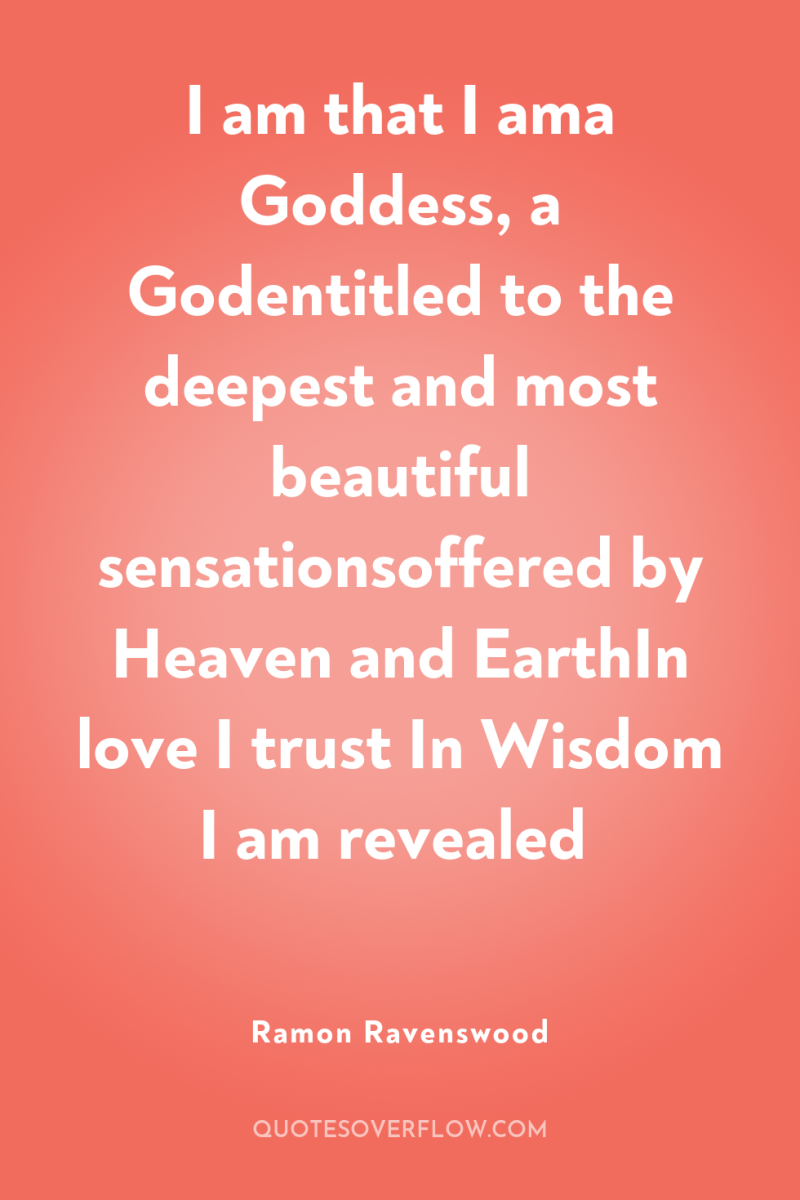
63
I am that I ama Goddess, a Godentitled to the deepest and most beautiful sensationsoffered by Heaven and EarthIn love I trust In Wisdom I am revealedRamon Ravenswood
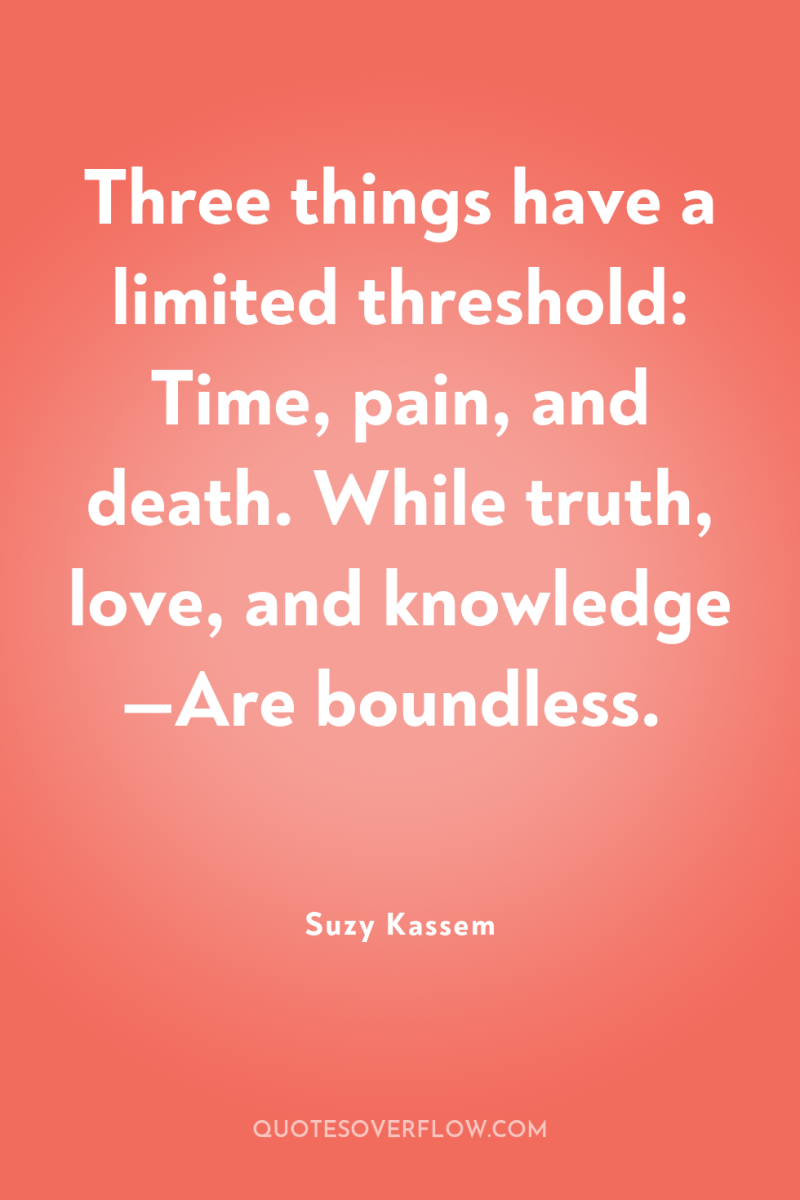
64
Three things have a limited threshold: Time, pain, and death. While truth, love, and knowledge —Are boundless.Suzy Kassem

65
People are a soul-ego-spacesuit.Stefan Emunds
66
Life is fundamentally a mental state. We live in a dream world that we create. Whose life is truer, the rational man of action pursuing practical goals of personal happiness and wealth or the philosophic man who lives in a world of theoretical and metaphysical ideas? We ascribe the value quotient to our lives by making decisions that we score as either valid or invalid based upon our personal ethics and how we think and behave.Kilroy J. Oldster
67
From the standpoint of daily life, however, there is one thing we do know: that we are here for the sake of each other - above all for those upon whose smile and well-being our own happiness depends, and also for the countless unknown souls with whose fate we are connected by a bond of sympathy. Many times a day I realize how much my own outer and inner life is built upon the labors of my fellow men, both living and dead, and how earnestly I must exert myself in order to give in return as much as I have received.Albert Einstein
68
The death of a dream can in fact serve as the vehicle that endows it with new form, with reinvigorated substance, a fresh flow of ideas, and splendidly revitalized color. In short, the power of a certain kind of dream is such that death need not indicate finality at all but rather signify a metaphysical and metaphorical leap forward.Aberjhani
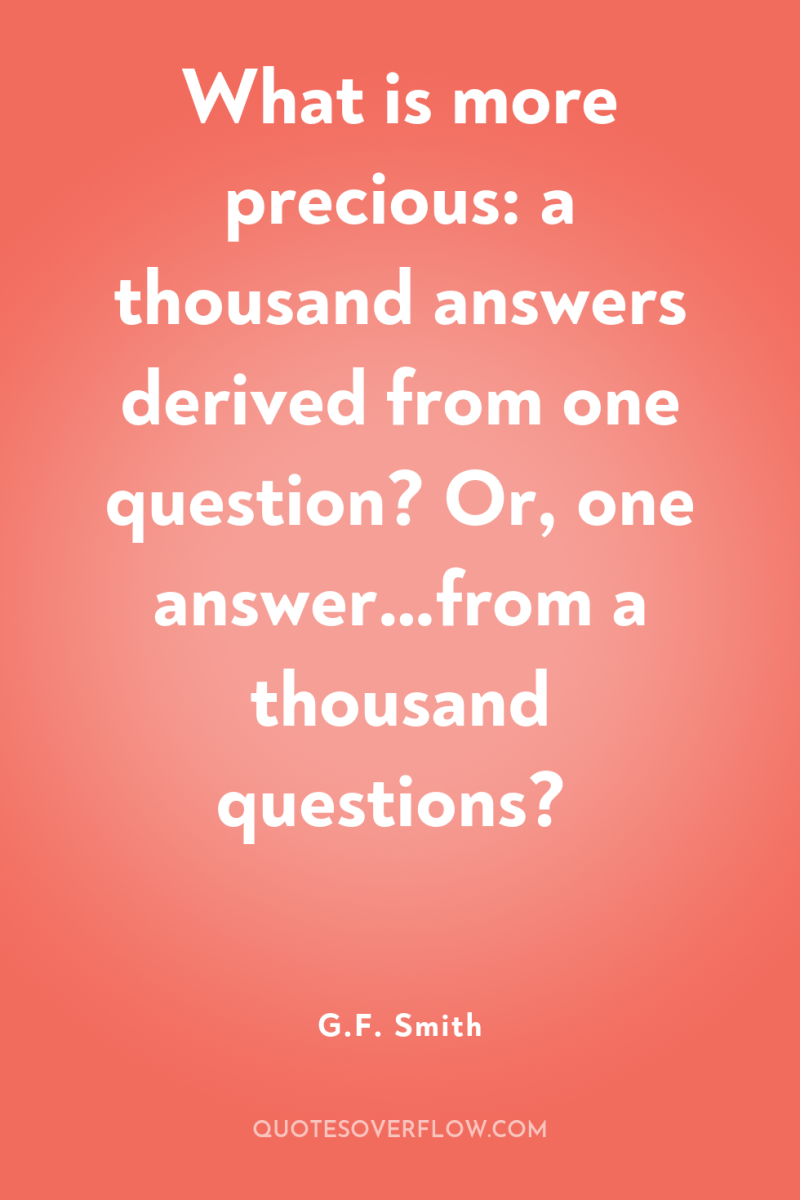
69
What is more precious: a thousand answers derived from one question? Or, one answer…from a thousand questions?G.F. Smith
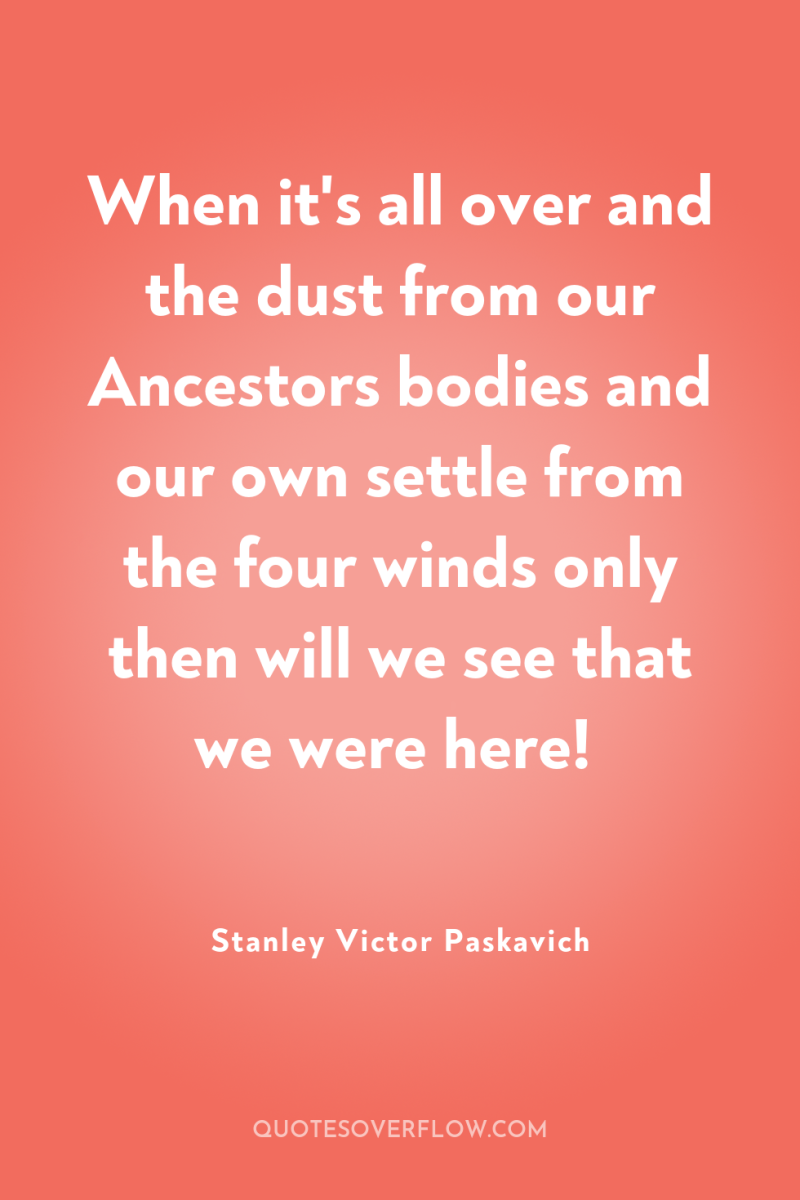
70
When it's all over and the dust from our Ancestors bodies and our own settle from the four winds only then will we see that we were here!Stanley Victor Paskavich
71
Everything turns in circles and spirals with the cosmic heart until infinity. Everything has a vibration that spirals inward or outward – and everything turns together in the same direction at the same time. This vibration keeps going: it becomes born and expands or closes and destructs – only to repeat the cycle again in opposite current. Like a lotus, it opens or closes, dies and is born again. Such is also the story of the sun and moon, of me and you. Nothing truly dies. All energy simply transforms. .Suzy Kassem
72
This book first arose out of a passage in Borges, out of the laughter that shattered, as I read the passage, all the familiar landmarks of my thought–our thought that bears the stamp of our age and our geography–breaking up all the ordered surfaces and all the planes with which we are accustomed to tame the wild profusion of existing things, and continuing long afterwards to disturb and threaten with collapse our age-old distinction between the Same and the Other. This passage quotes a ‘certain Chinese encyclopaedia’ in which it is written that ‘animals are divided into: (a) belonging to the Emperor, (b) embalmed, (c) tame, (d) suckling pigs, (e) sirens, (f) fabulous, (g) stray dogs, (h) included in the present classification, (i) frenzied, (j) innumerable, (k) drawn with a very fine camelhair brush, (l) et cetera, (m) having just broken the water pitcher, (n) that from a long way off look like flies’. In the wonderment of this taxonomy, the thing we apprehend in one great leap, the thing that, by means of the fable, is demonstrated as the exotic charm of another system of thought, is the limitation of our own, the stark impossibility of thinking that.Michel Foucault
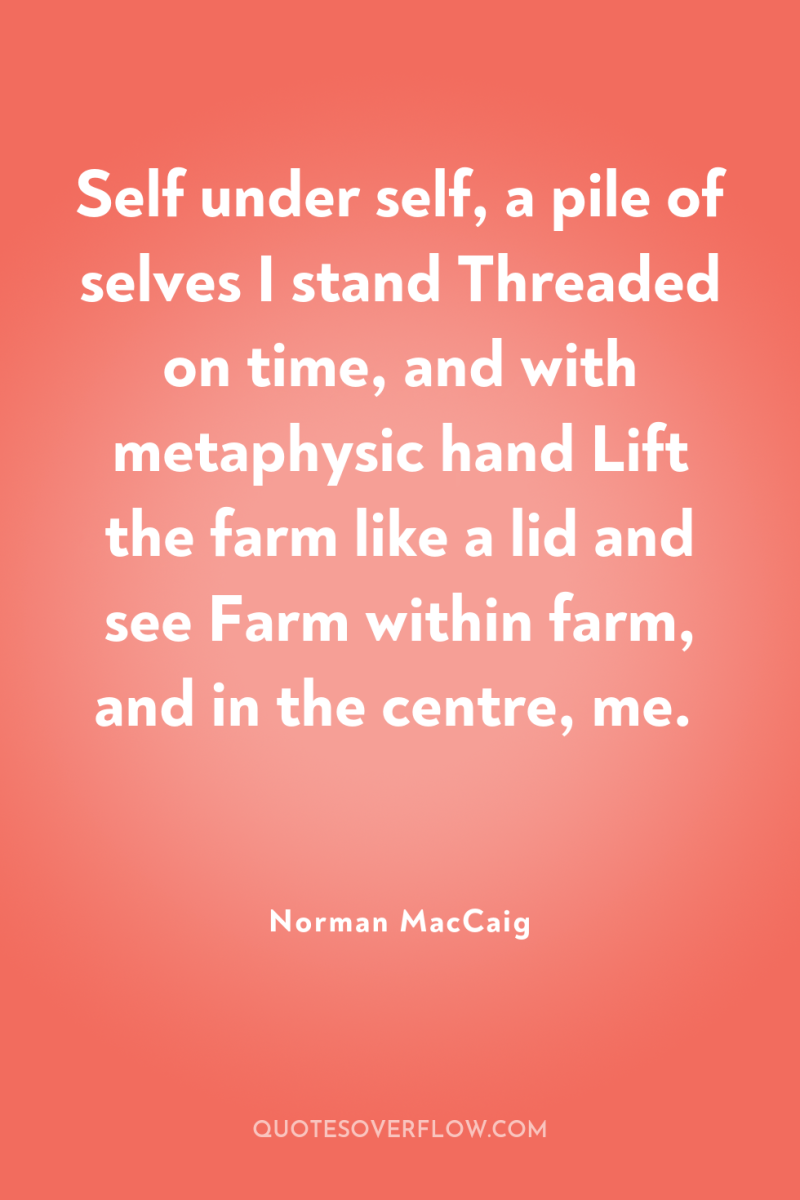
73
Self under self, a pile of selves I stand Threaded on time, and with metaphysic hand Lift the farm like a lid and see Farm within farm, and in the centre, me.Norman MacCaig

74
I have met the devil - he is not!Fakeer Ishavardas

75
Oh Time, you arise with parting! [О ВремÑ, Ñ‚Ñ‹ оÑ‚ разлуки! ]- Vladislav Khalyavkin, The OperatorVladislav Khalyavkin

76
One possibility is: God is nothing but the power of the universe to organize itself.Lee Smolin
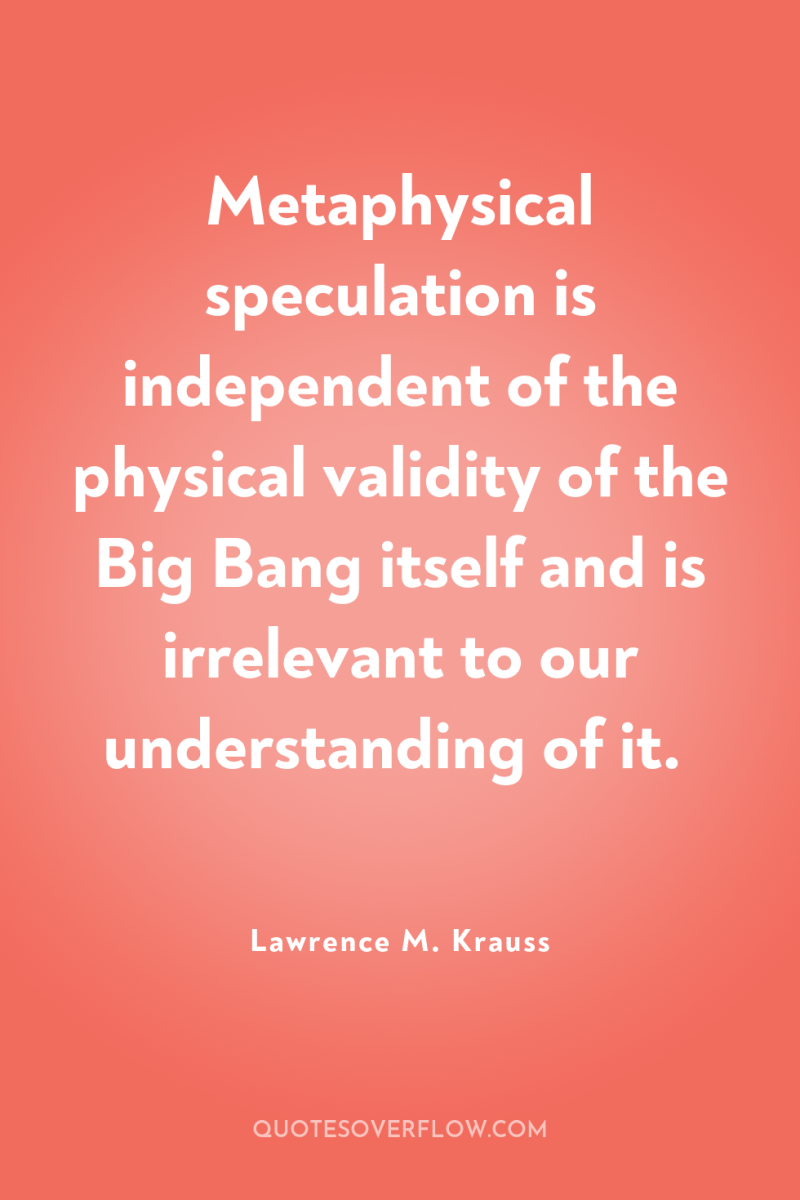
77
Metaphysical speculation is independent of the physical validity of the Big Bang itself and is irrelevant to our understanding of it.Lawrence M. Krauss
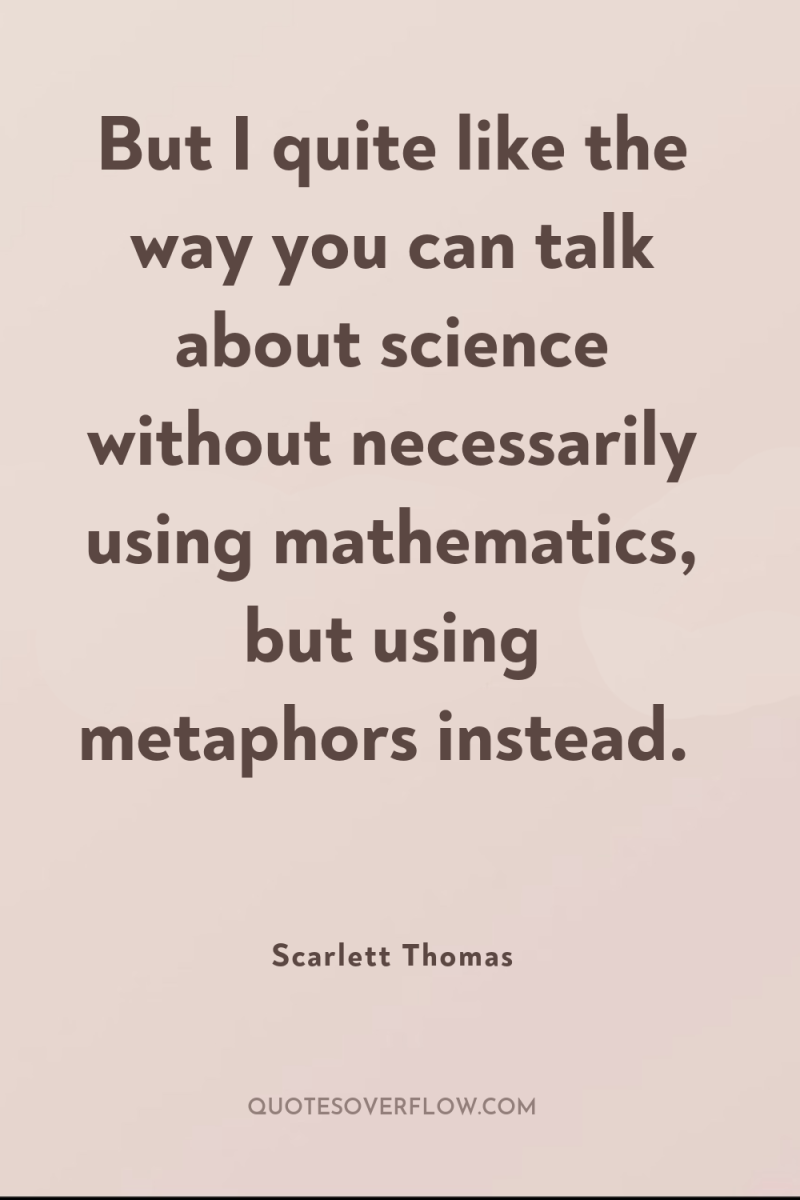
78
But I quite like the way you can talk about science without necessarily using mathematics, but using metaphors instead.Scarlett Thomas
79
A great physicist is always a metaphysicist as well he has a higher concept of his knowledge and his task.Unknown
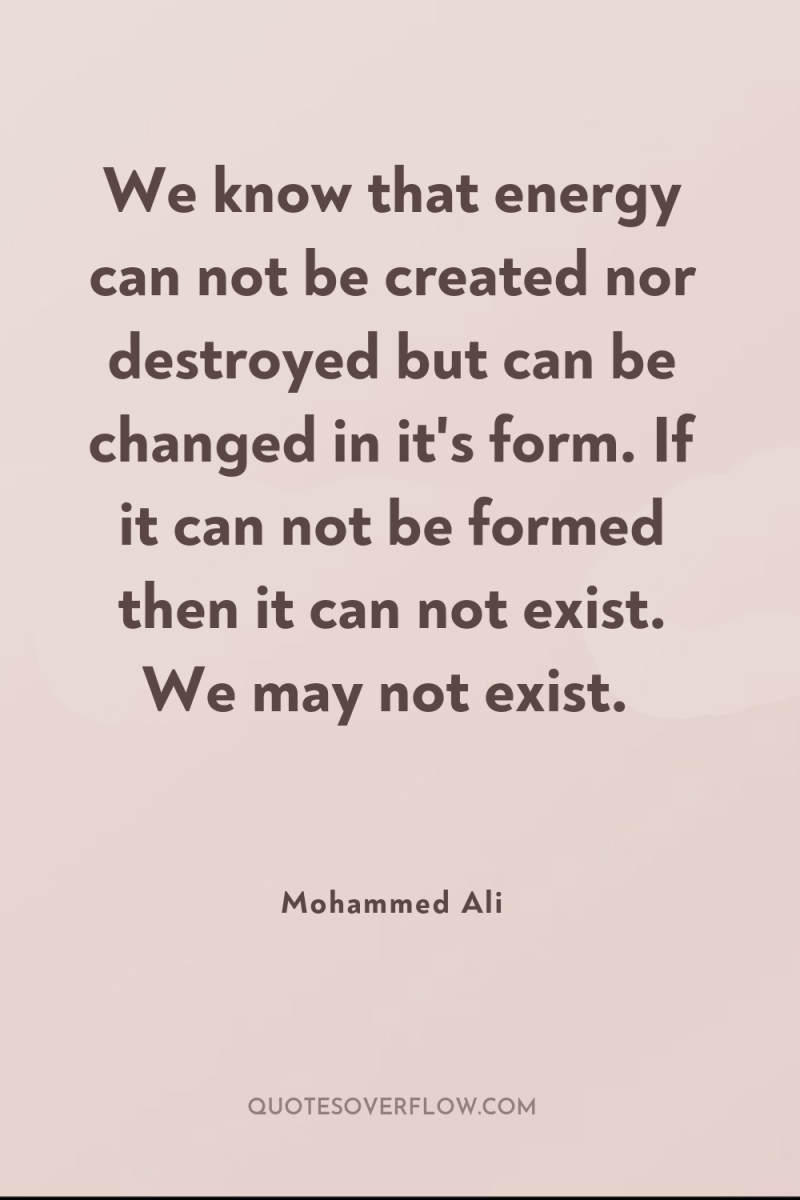
80
We know that energy can not be created nor destroyed but can be changed in it's form. If it can not be formed then it can not exist. We may not exist.Mohammed Ali
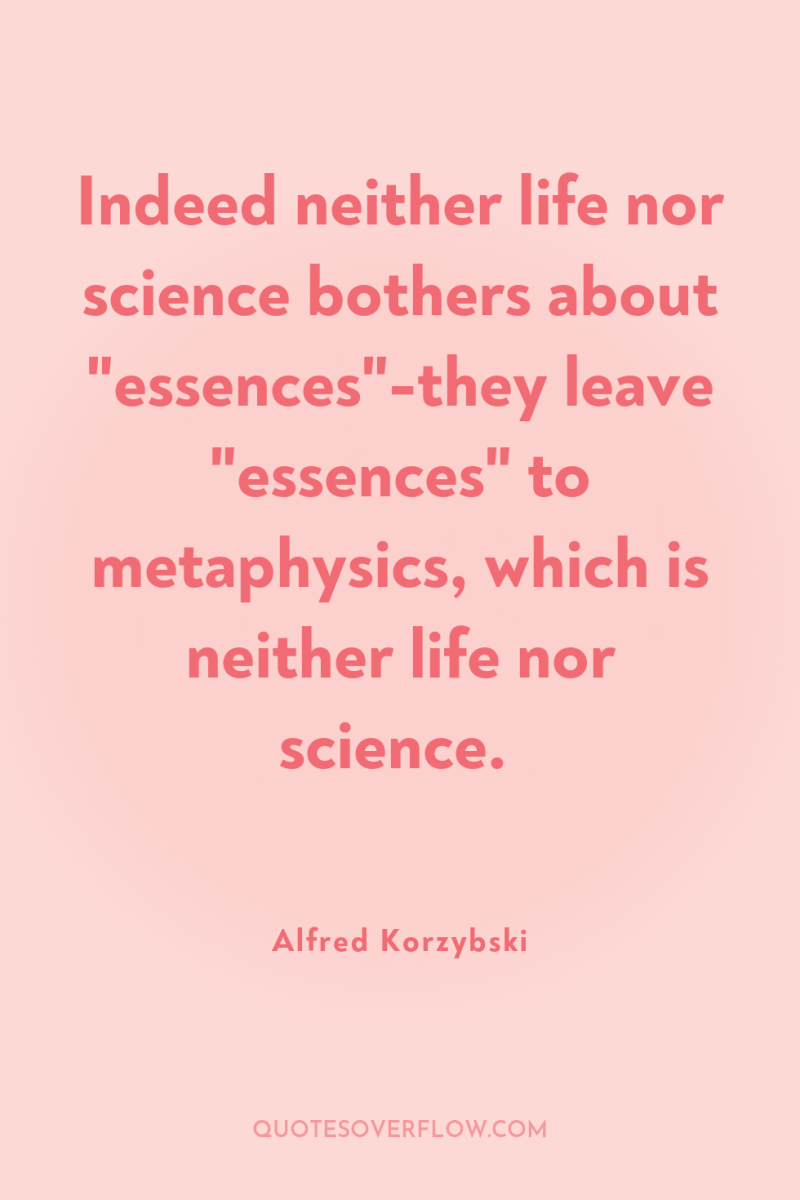
81
Indeed neither life nor science bothers about "essences"-they leave "essences" to metaphysics, which is neither life nor science.Alfred Korzybski
82
.. . the abandonment of metaphysics involves more than the redefinition of the nature of rational inquiry in accordance with the tenets of modern scientific methodology this redefinition itself makes matters of value and validity mere matters of opinion.Alan White
83
That there is indeed a limit upon science is made very likely by the existence of questions that science cannot answer and that no conceivable advance of science would empower it to answer… It is not to science, therefore but to metaphysics, imaginative literature or religion that we must turn for answers to questions having to do with first and last things.Peter Medawar

84
I don’t do metaphysics. Neither do I have the luxury to talk about my beliefs.Abhijit Naskar
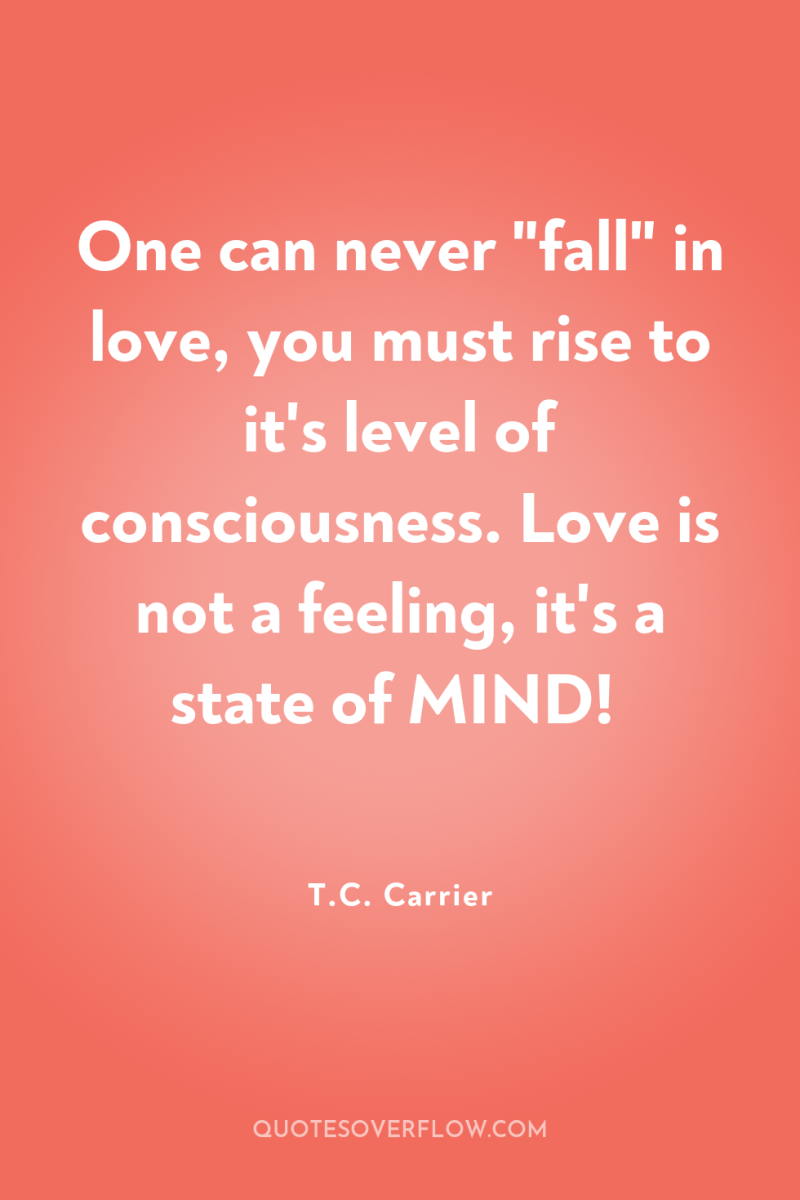
85
One can never "fall" in love, you must rise to it's level of consciousness. Love is not a feeling, it's a state of MIND!T.C. Carrier

86
Passion presented with a greater challenge achieves a greater goal.-- from The Sexual Side of SpiritualityAberjhani
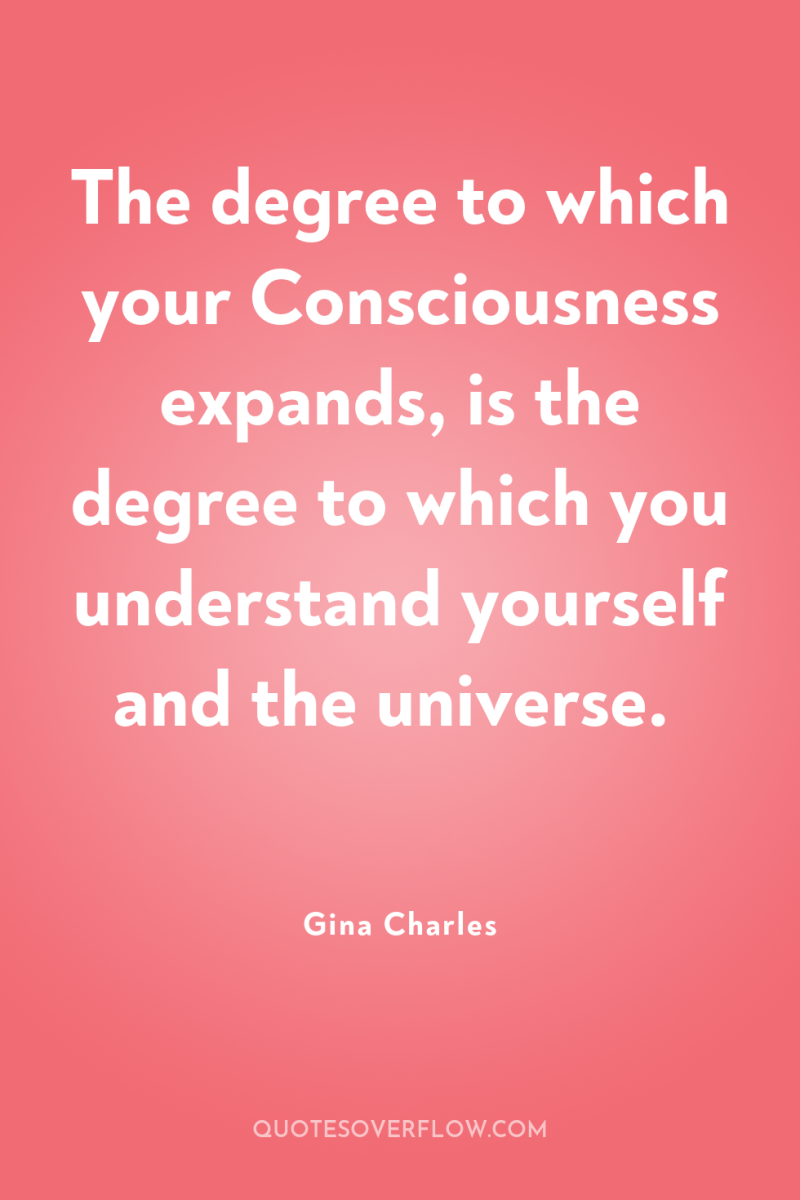
87
The degree to which your Consciousness expands, is the degree to which you understand yourself and the universe.Gina Charles
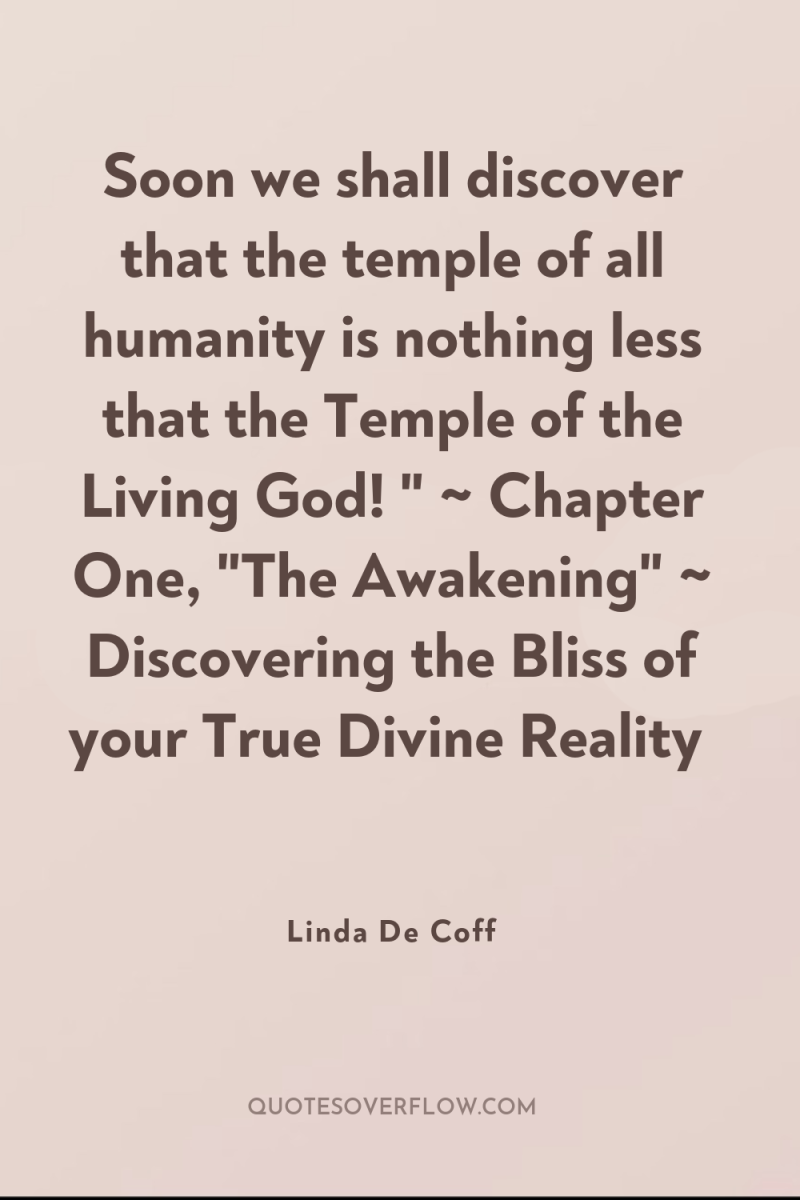
88
Soon we shall discover that the temple of all humanity is nothing less that the Temple of the Living God! " ~ Chapter One, "The Awakening" ~ Discovering the Bliss of your True Divine RealityLinda De Coff
89
Sentinels of treesbreathe life into bodies of earthly flesh As their mighty arms reach to the starswe join in their quest for Helios’s mighty power Like sentinels, we seek our placein the forest of nature’s gentle breathRamon Ravenswood
90
You whom my body longs for, where are you? In the stars, in the river, over the rainbow? Perhaps you hide in the shadows of the mountains, whistling in the wind through mighty peaks Just maybe you are in every corner of my beingawaiting invocationÔ Manna Breathfill my life with your infinite powerRamon Ravenswood
91
Every second, every minute, every hourour bodies breathe in the manna of Heaven.Our bodies resonate with the love and powerof creative cosmic rhythmsdancing through every cell in our beautiful beingness. Heaven is the heart of our atomic structure. Only with realisation of God manna within can the external cosmic energy fuse and ignite eternal bliss. Manna from Heaven.Ramon Ravenswood
92
Easter blessings All life’s sacrifices like autumn leavesawaken our sensesand power to love and be whole Our Mother Earth, Our Father Skyembraces our happiness and laughter Praise be to freedom and life’s seasons Praise be to Christ’s freedom songRamon Ravenswood
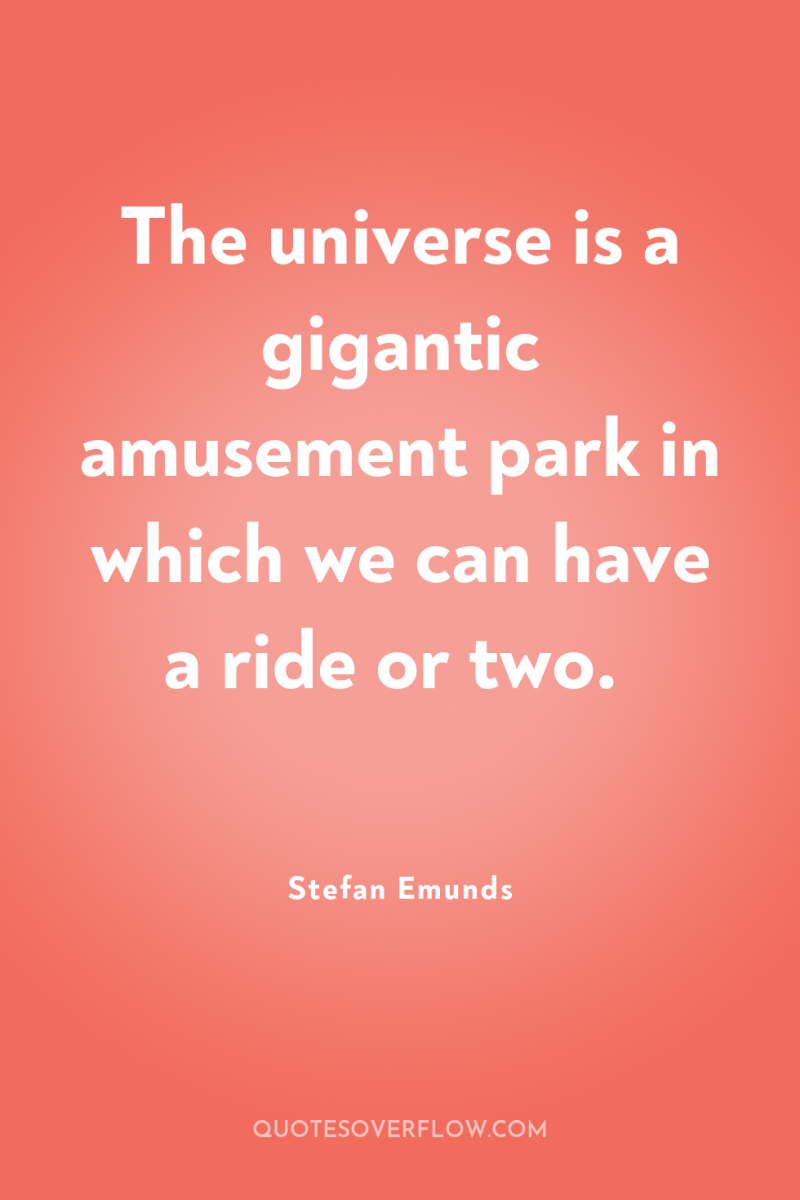
93
The universe is a gigantic amusement park in which we can have a ride or two.Stefan Emunds
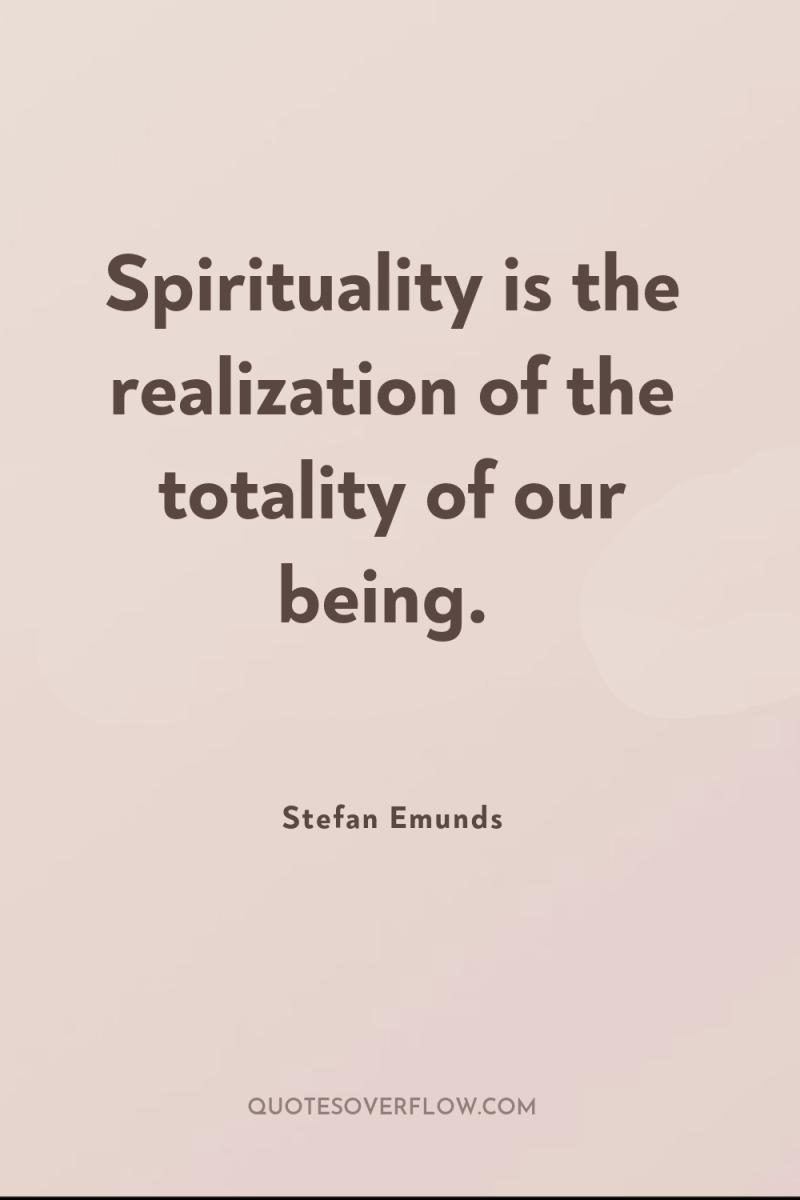
94
Spirituality is the realization of the totality of our being.Stefan Emunds
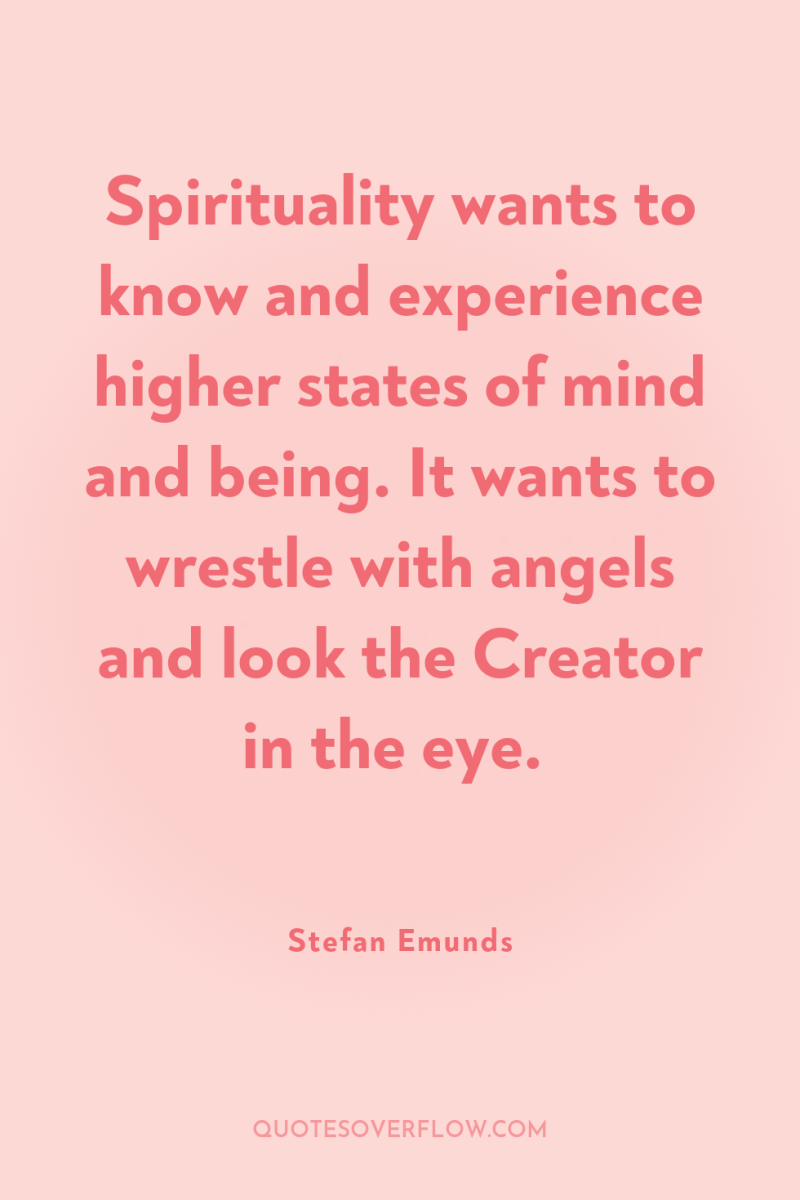
95
Spirituality wants to know and experience higher states of mind and being. It wants to wrestle with angels and look the Creator in the eye.Stefan Emunds

96
Spirituality is 80% attitude and 20% knowledge.Stefan Emunds
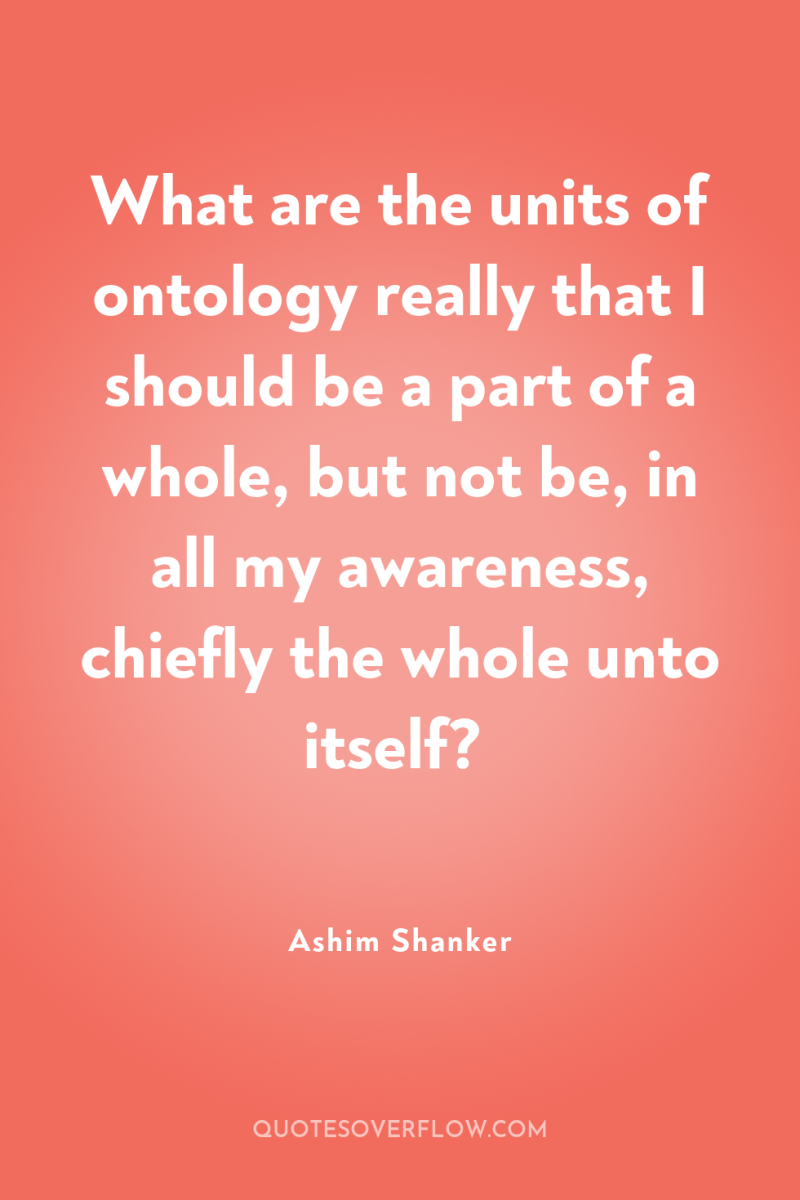
97
What are the units of ontology really that I should be a part of a whole, but not be, in all my awareness, chiefly the whole unto itself?Ashim Shanker

98
I hear them say "Why do I miss someone I haven't even met?" How about not missing someone because it feels like they've been with you all along?Nicola An
99
The Talmud states, "Do not be daunted by the enormity of the world's grief. Do justly now, love mercy now, walk humbly now. You are not obligated to complete the work, but neither are you free to abandon it.Bridges McCall

100
Change happens very slow and very sudden.Dorothy Bryant